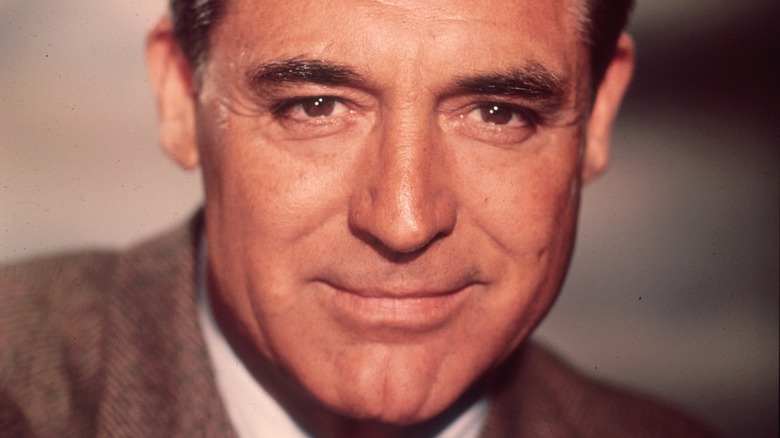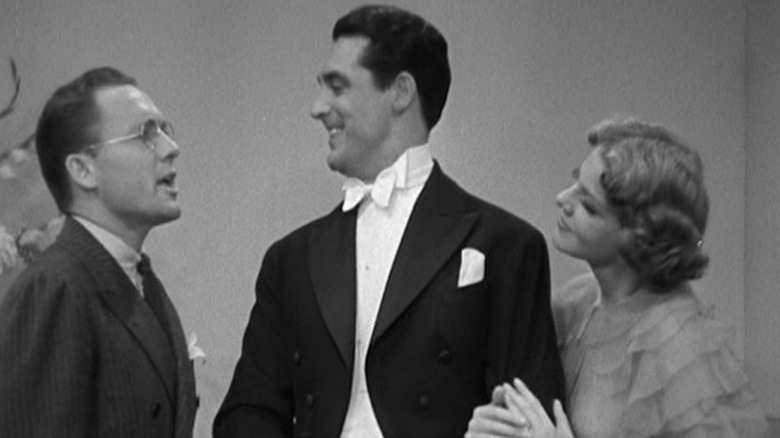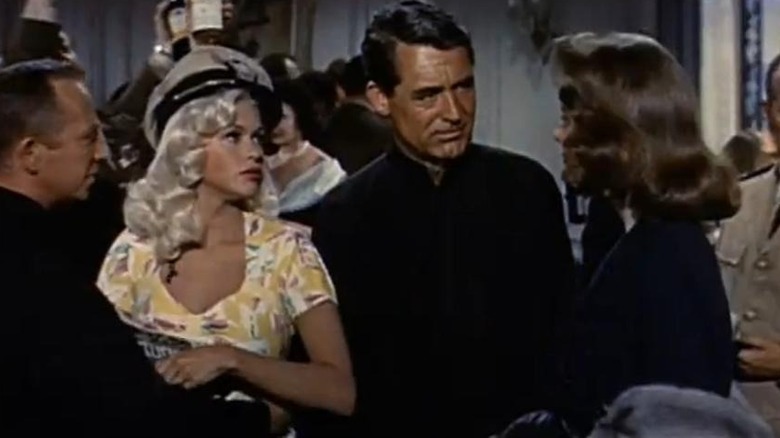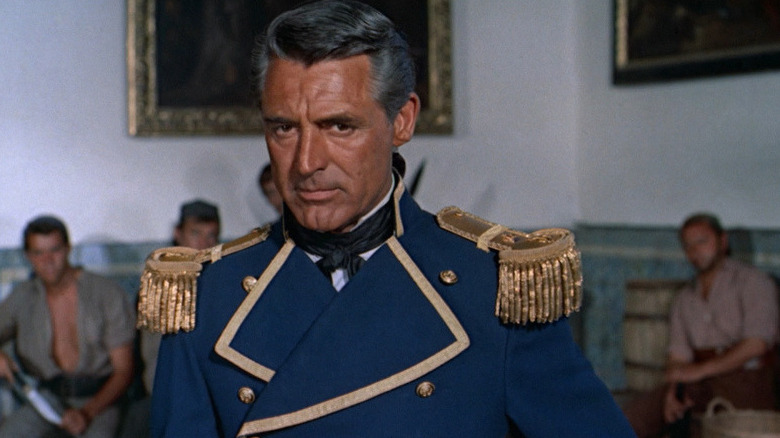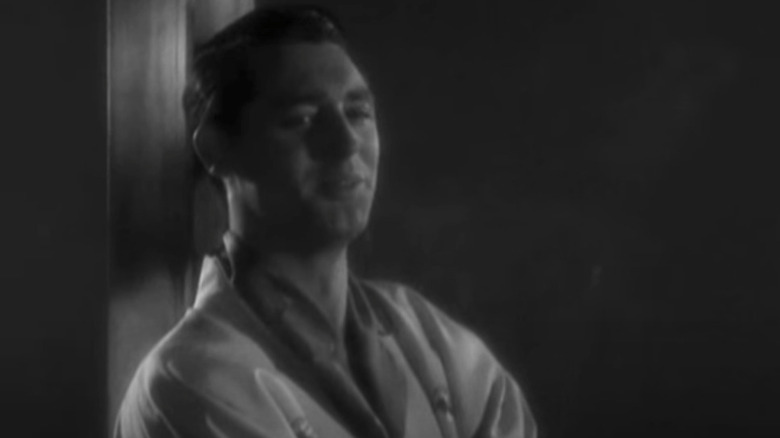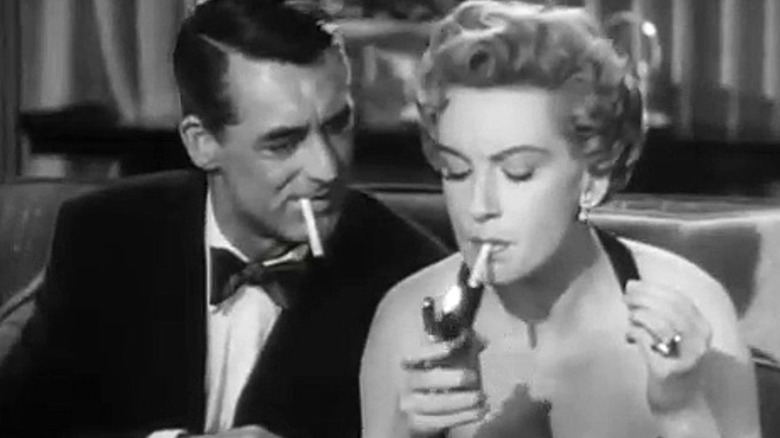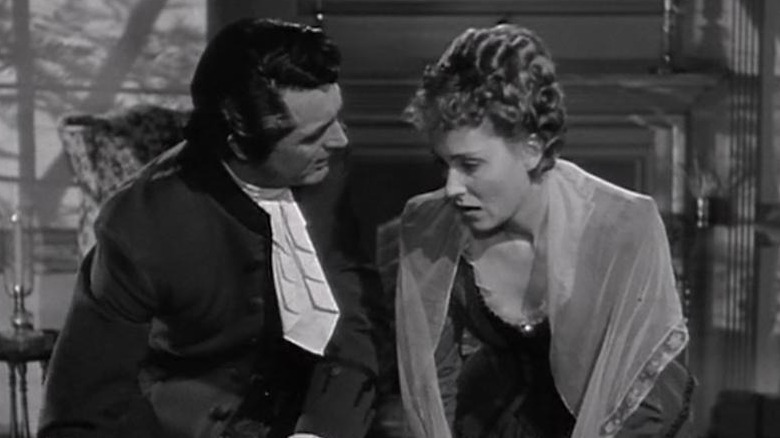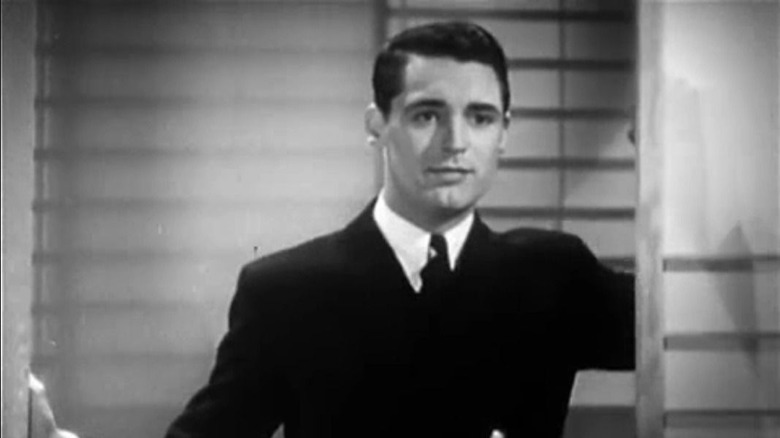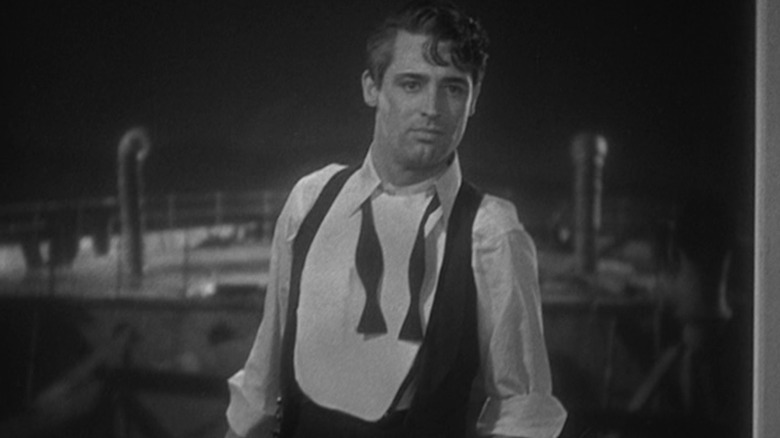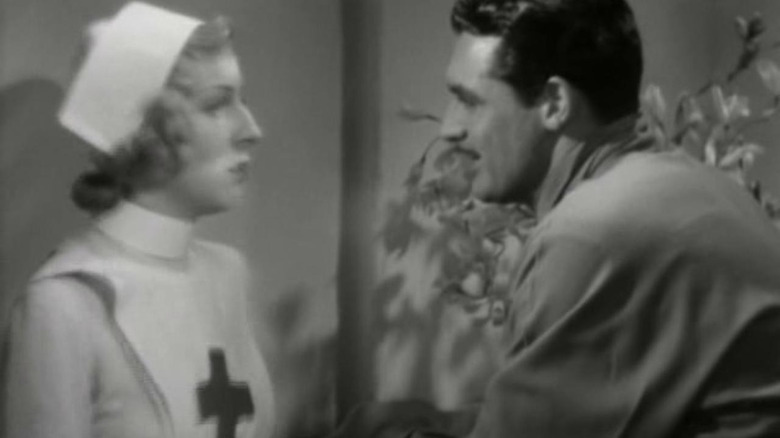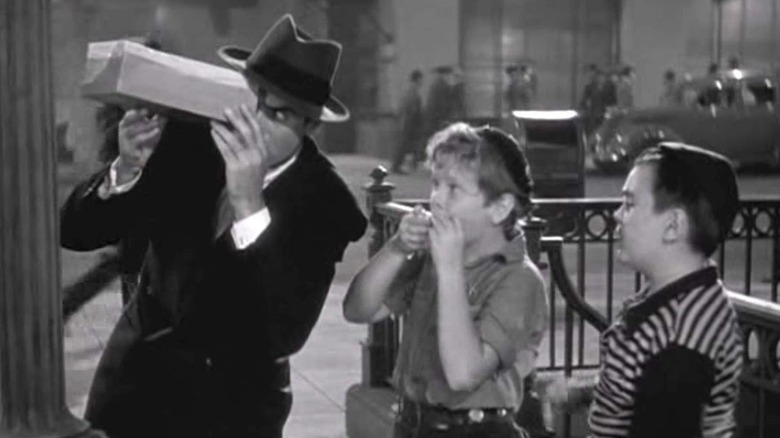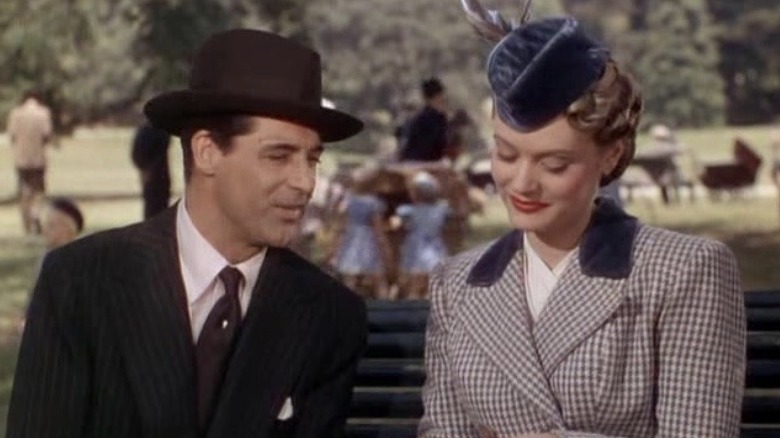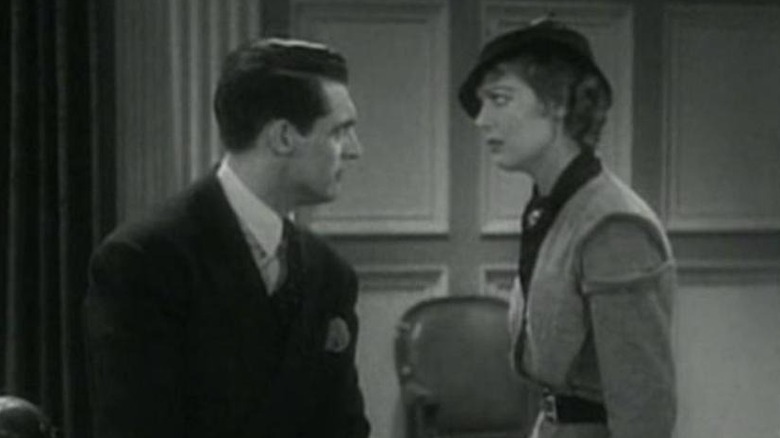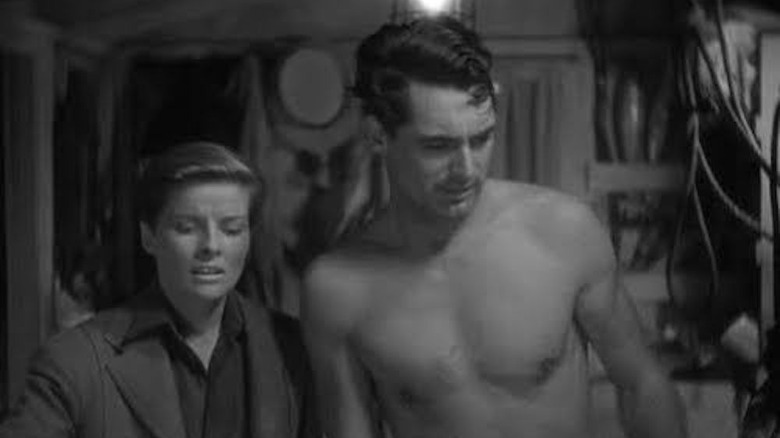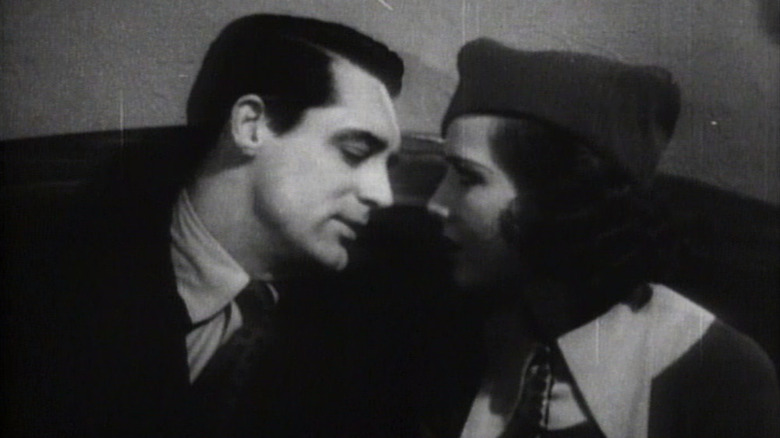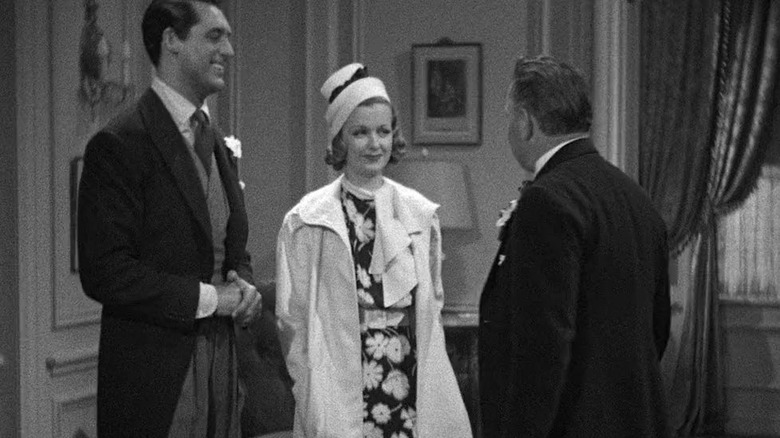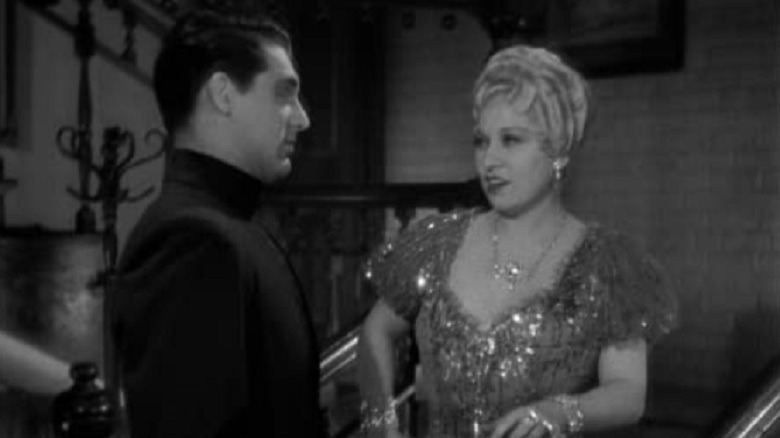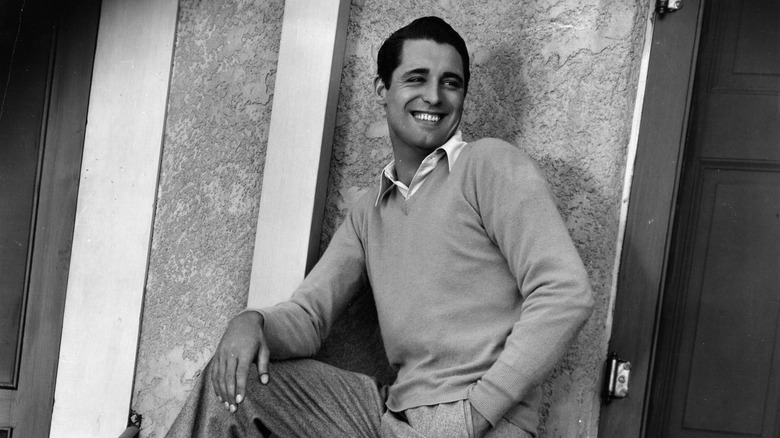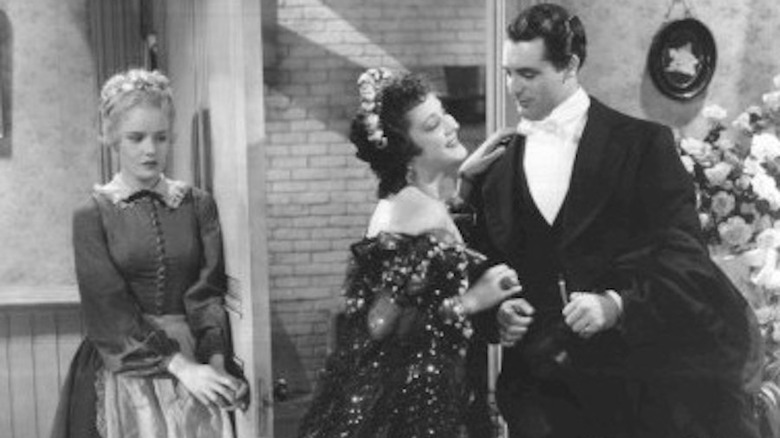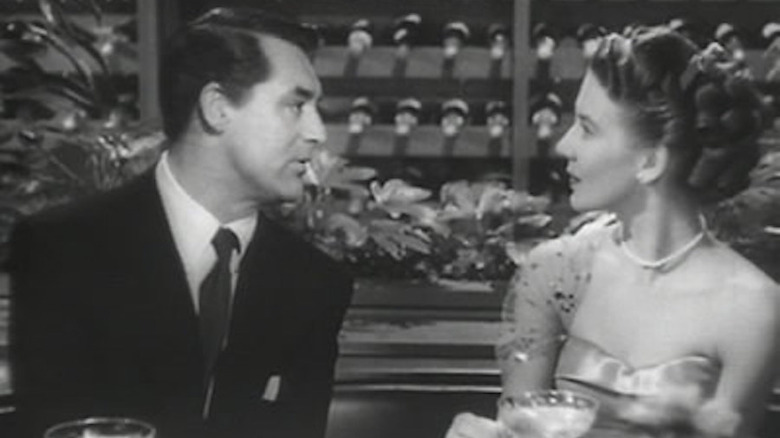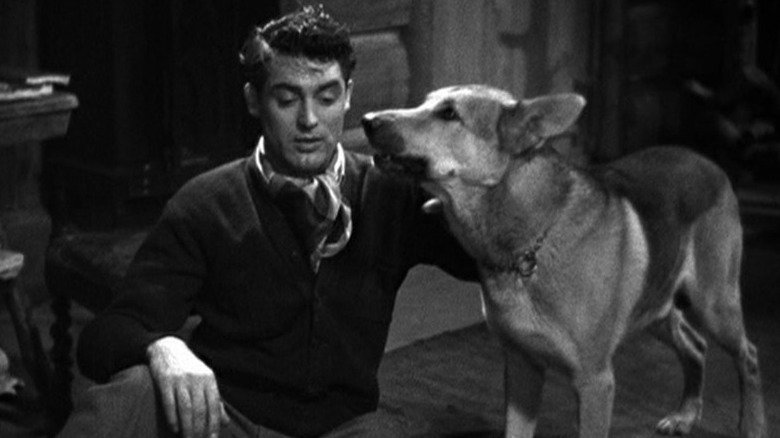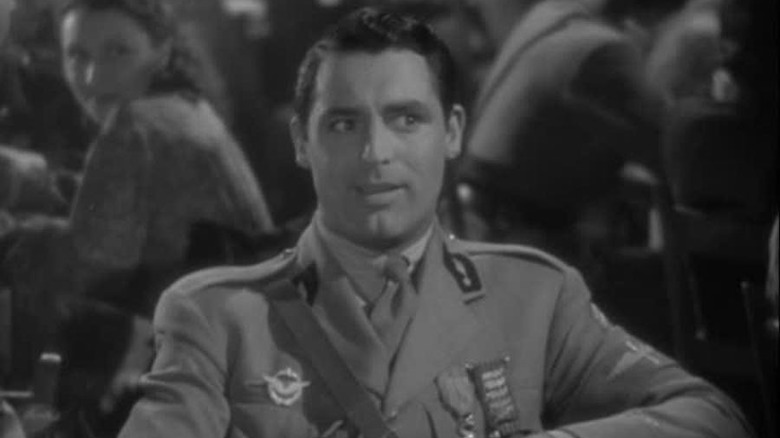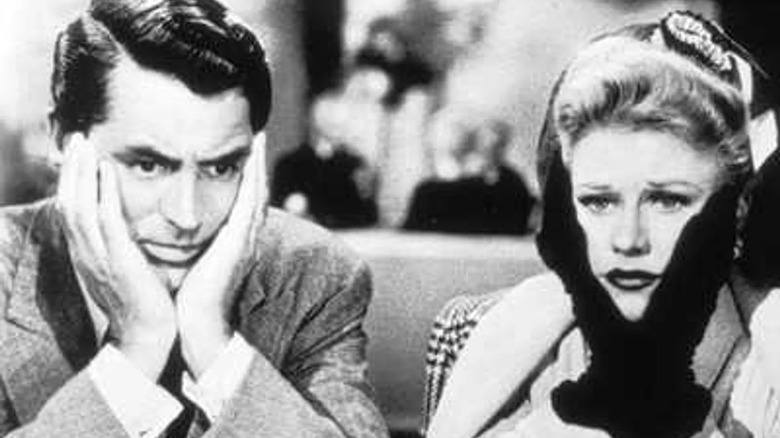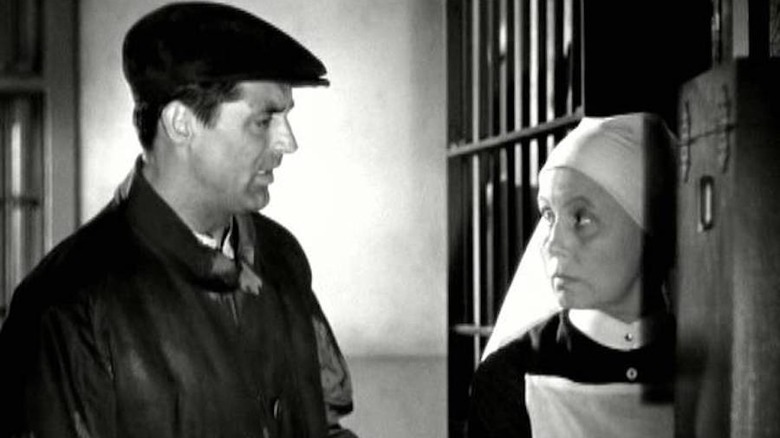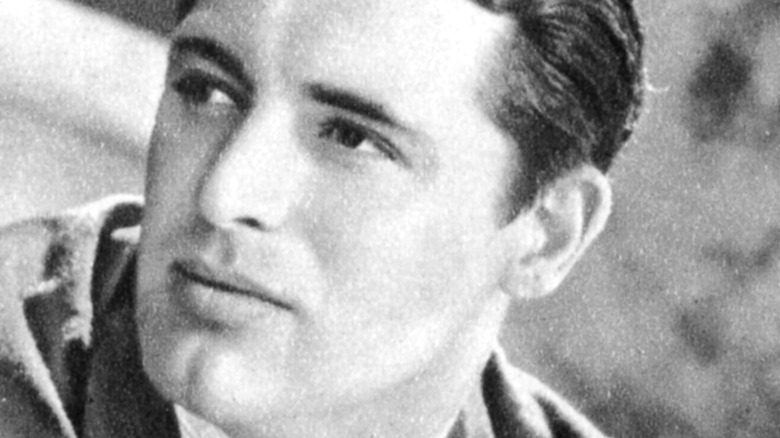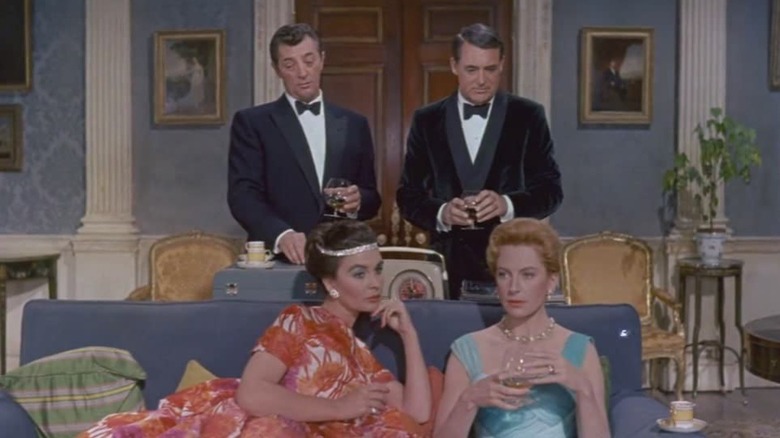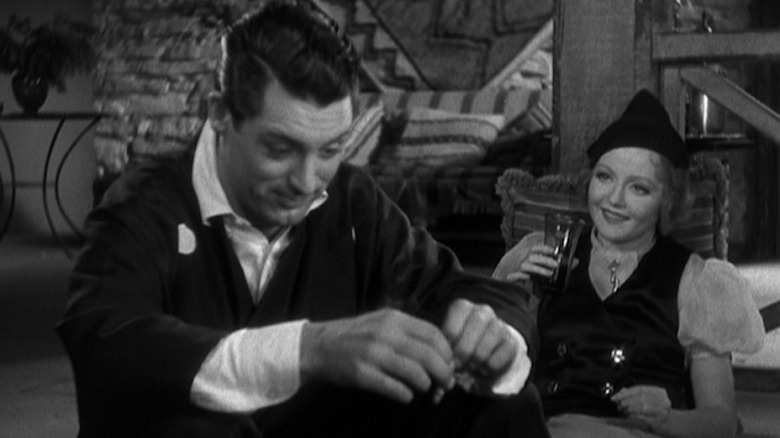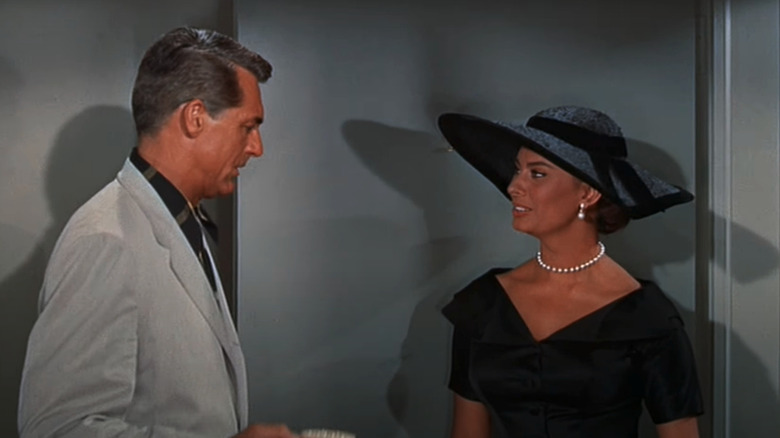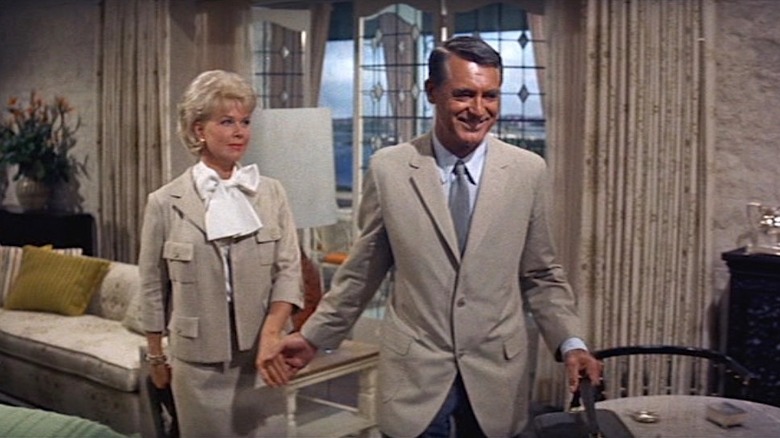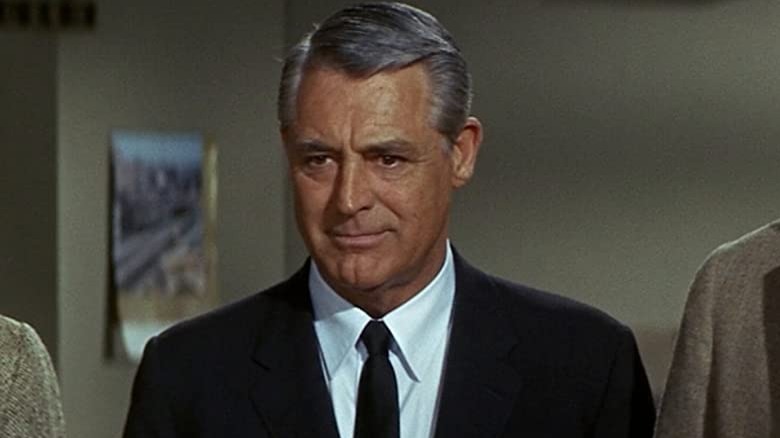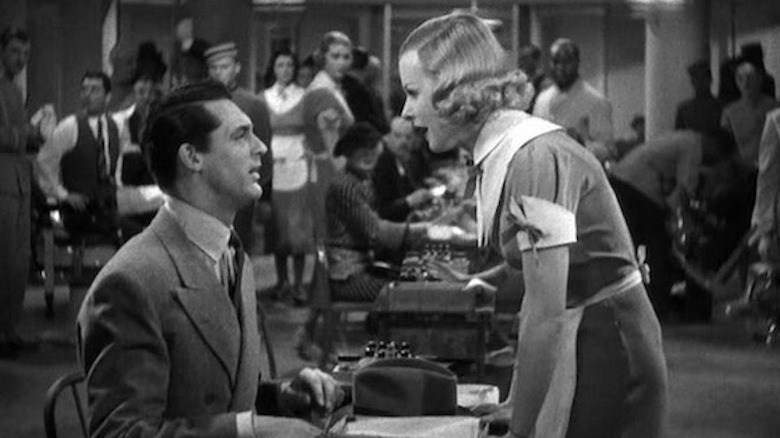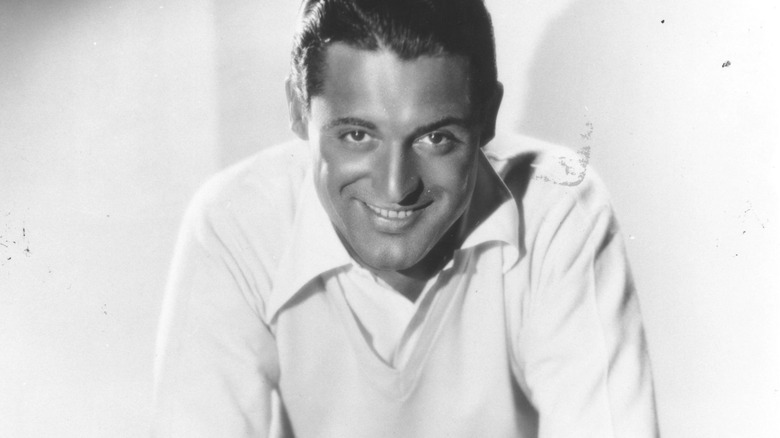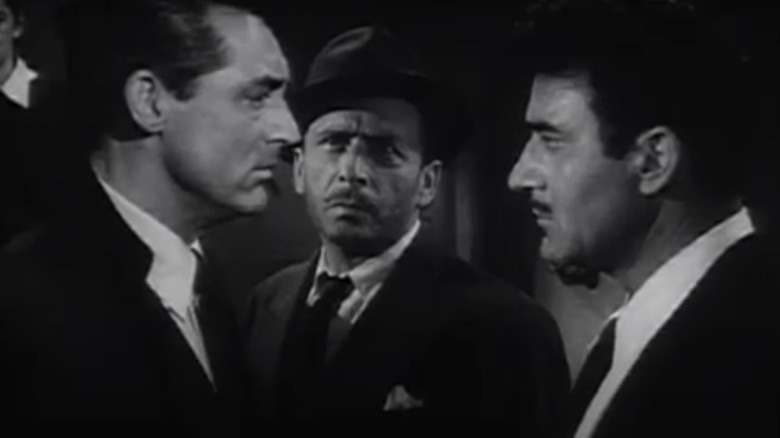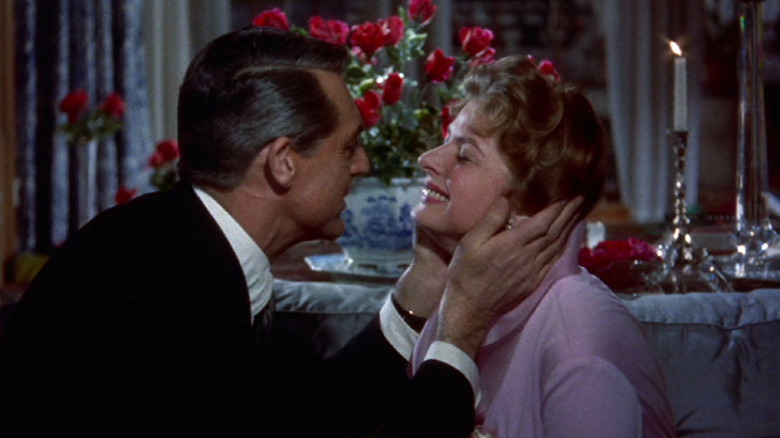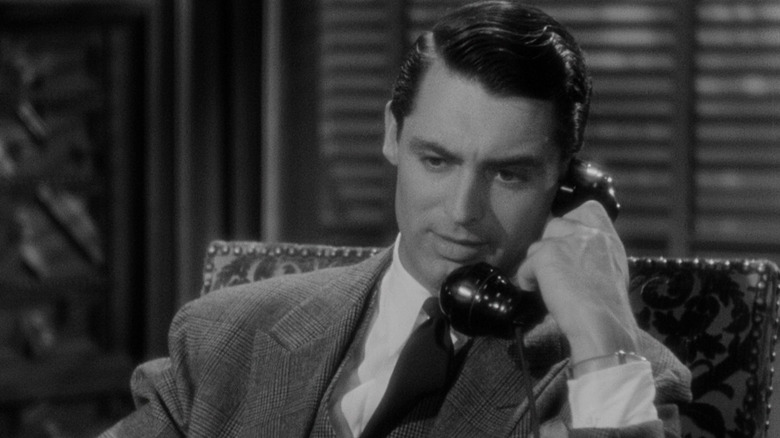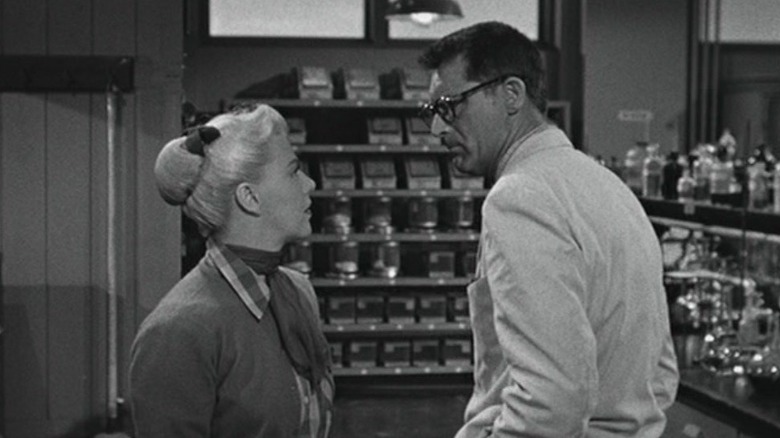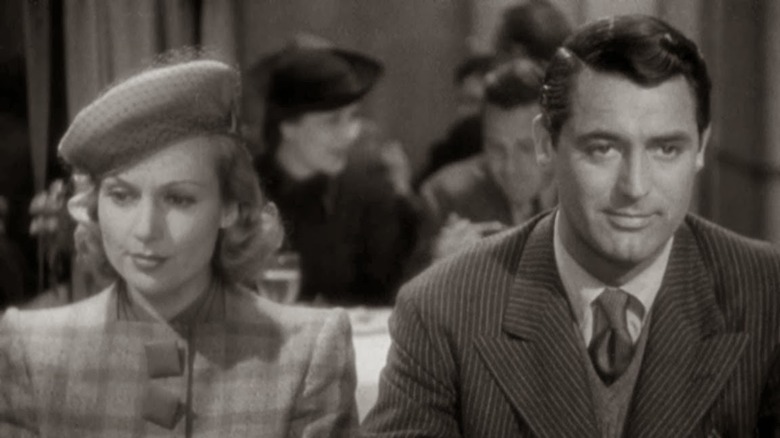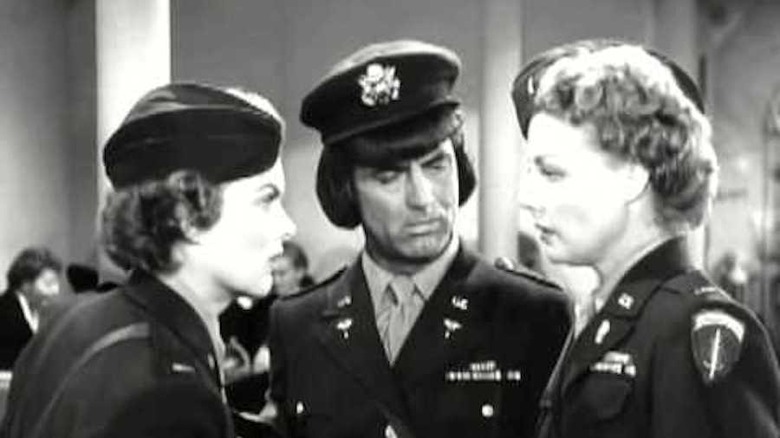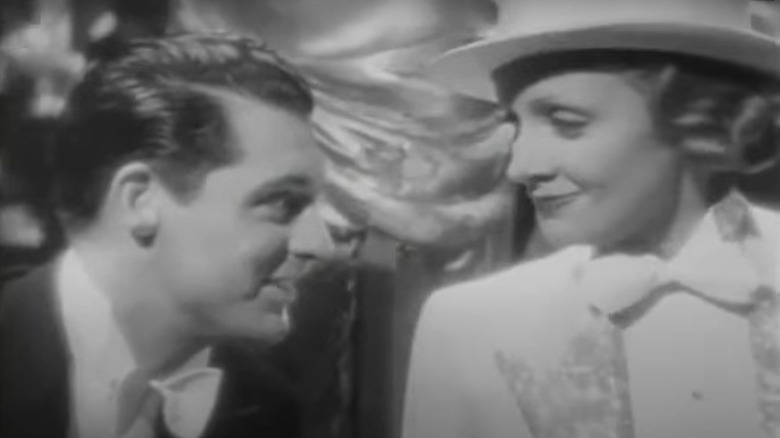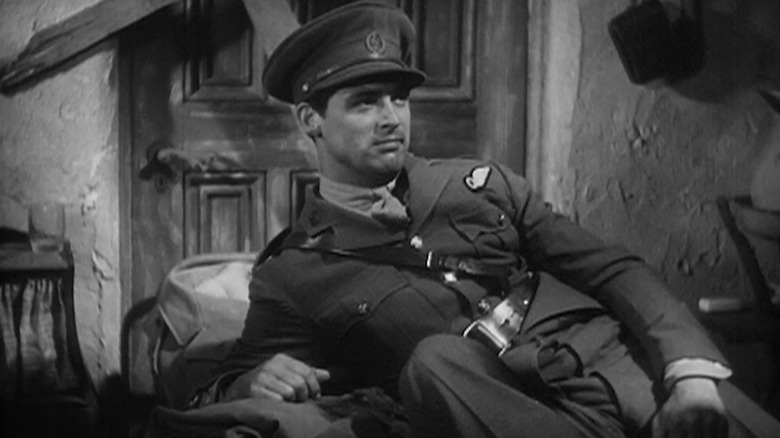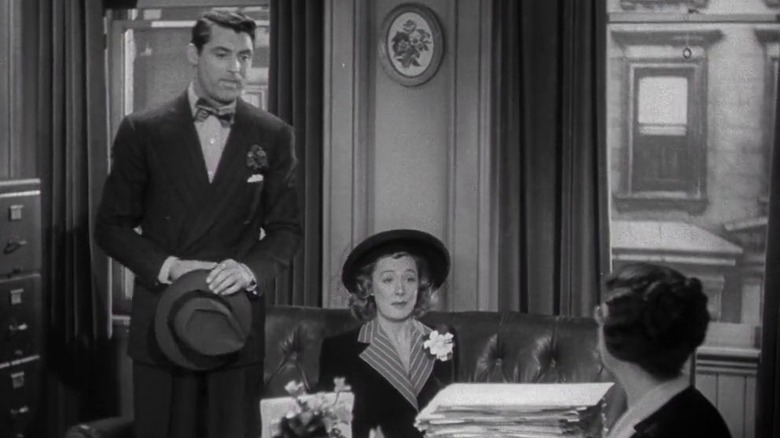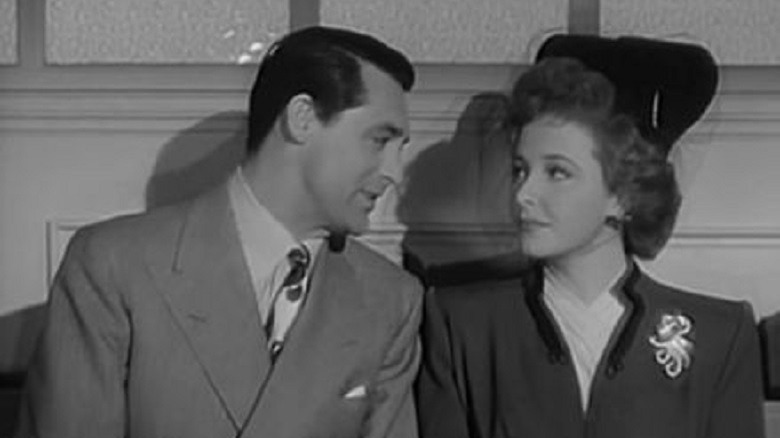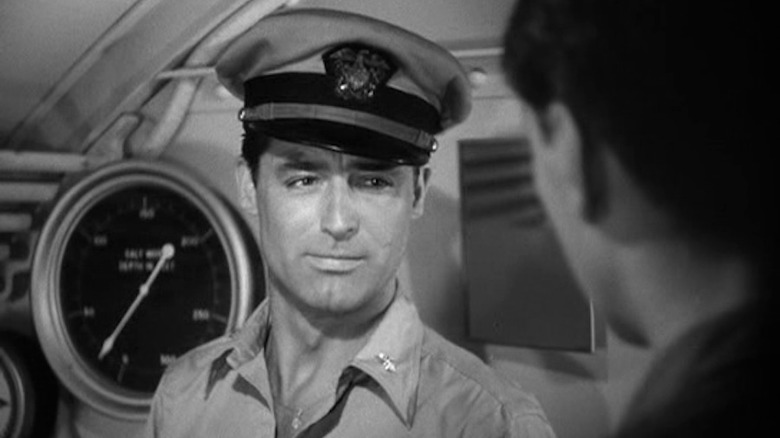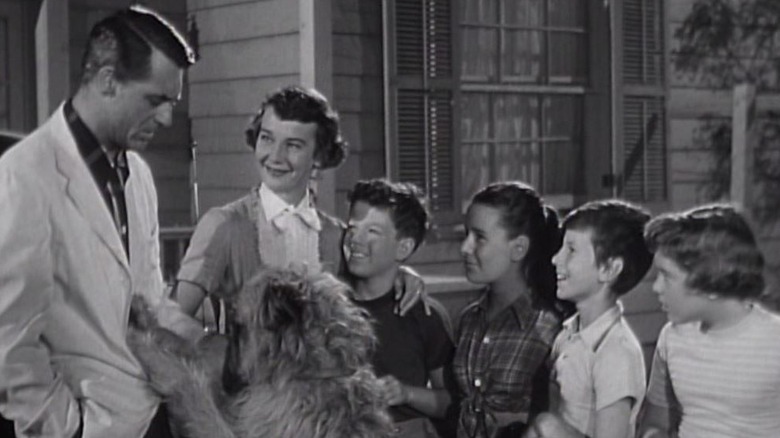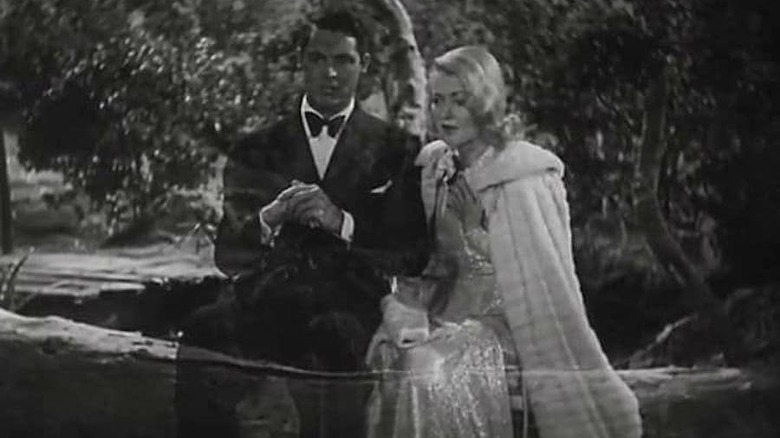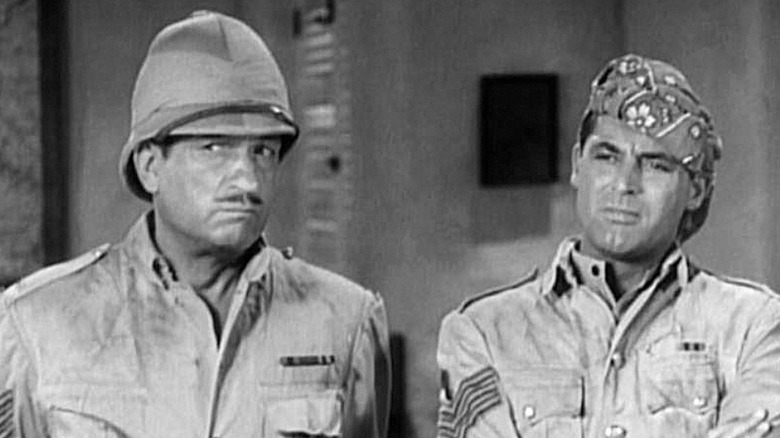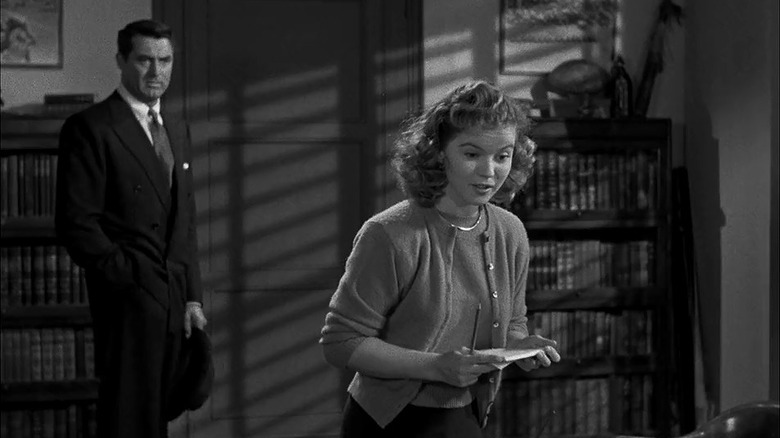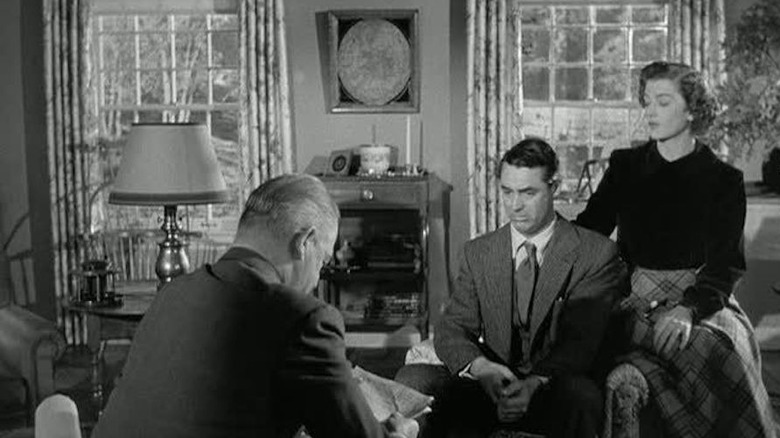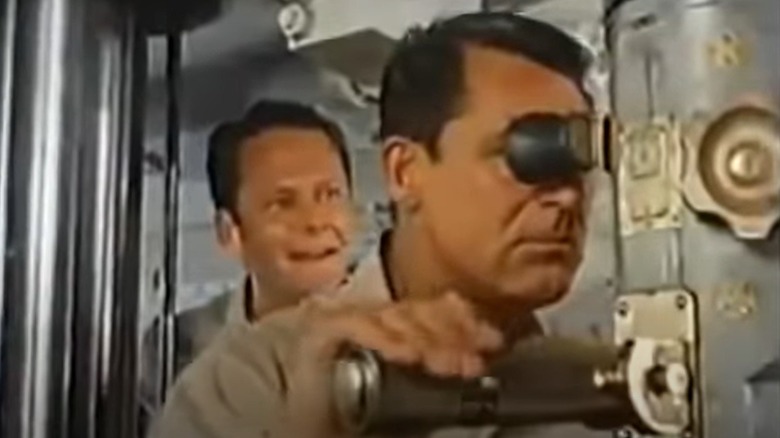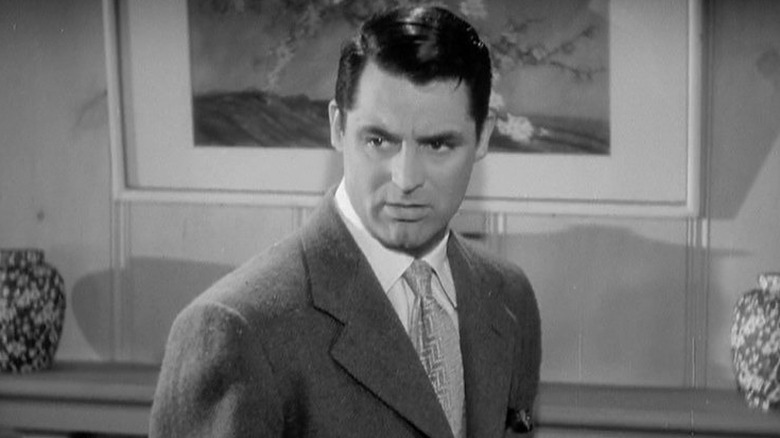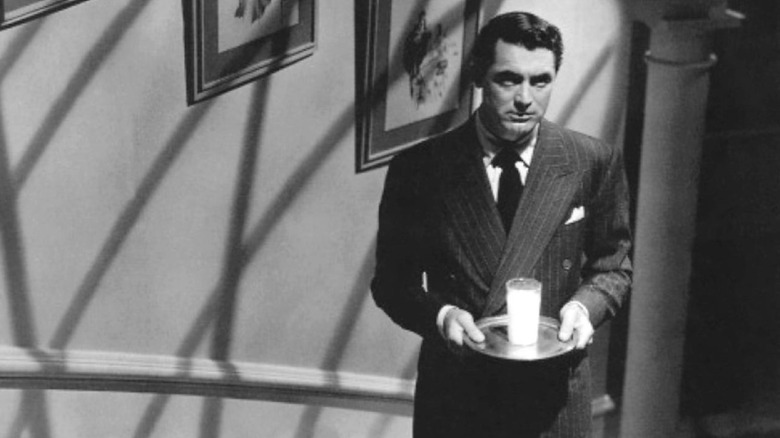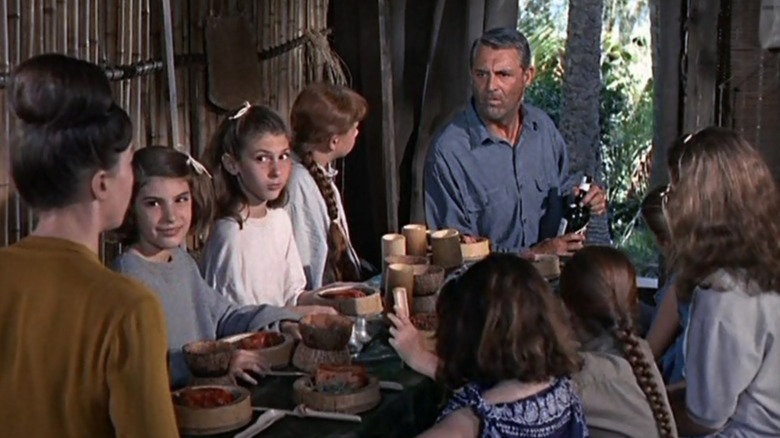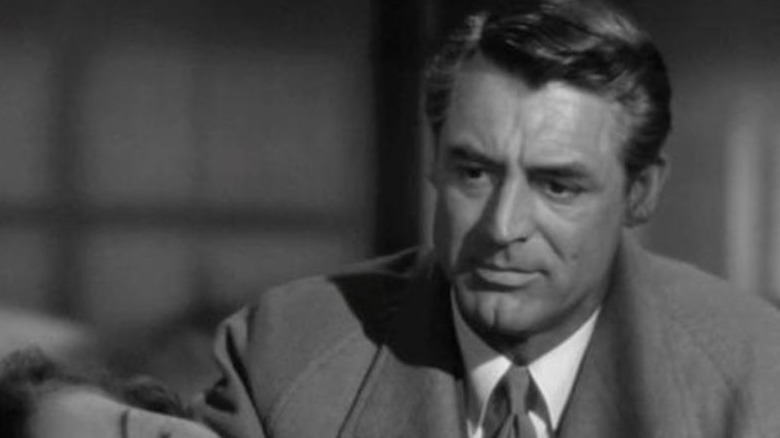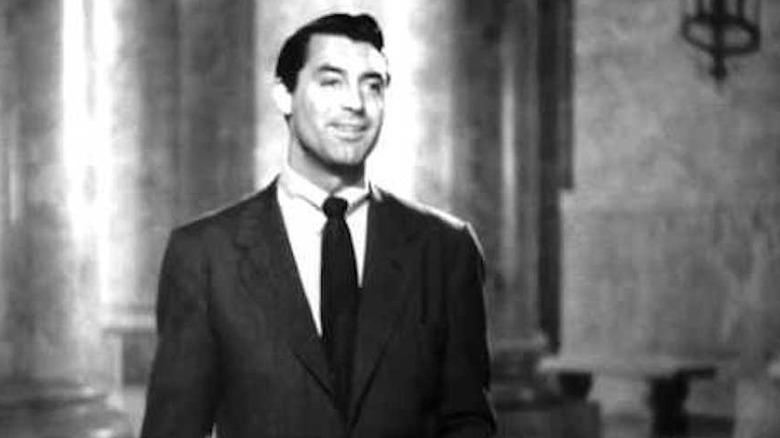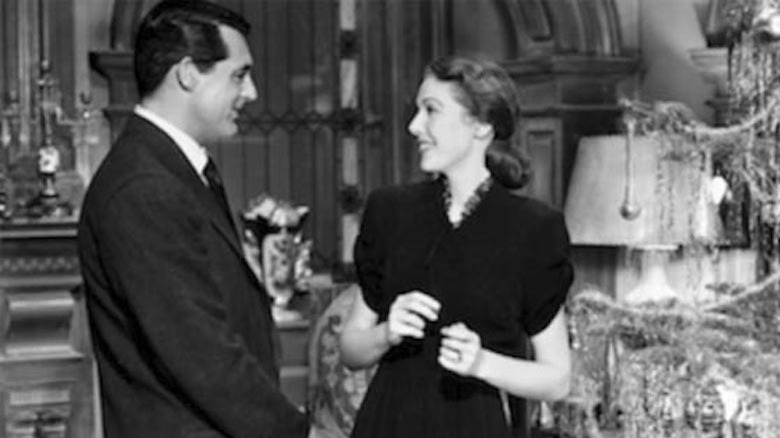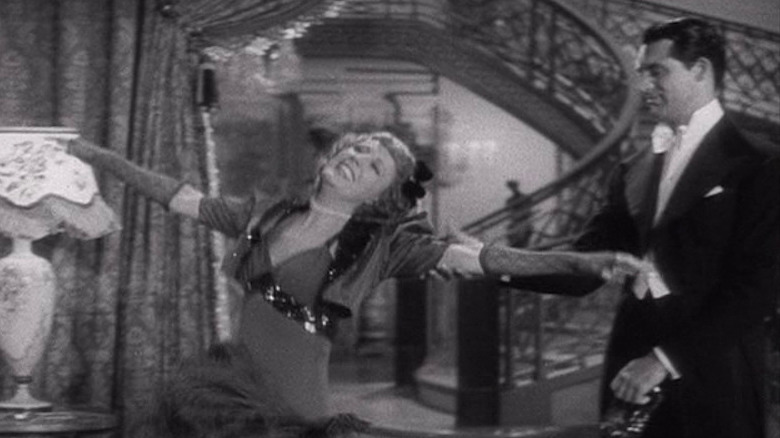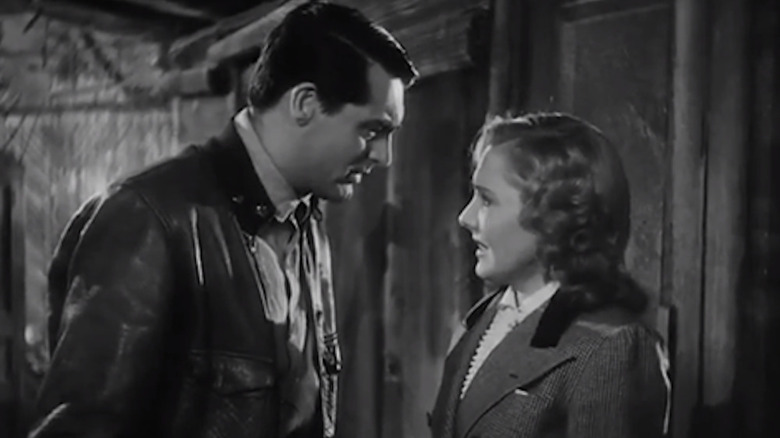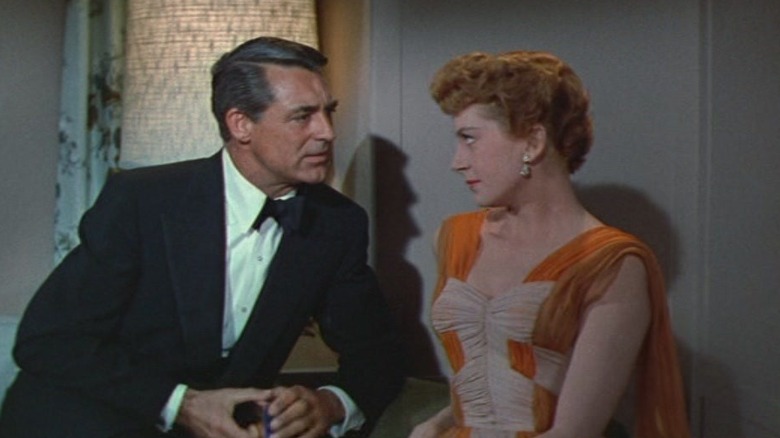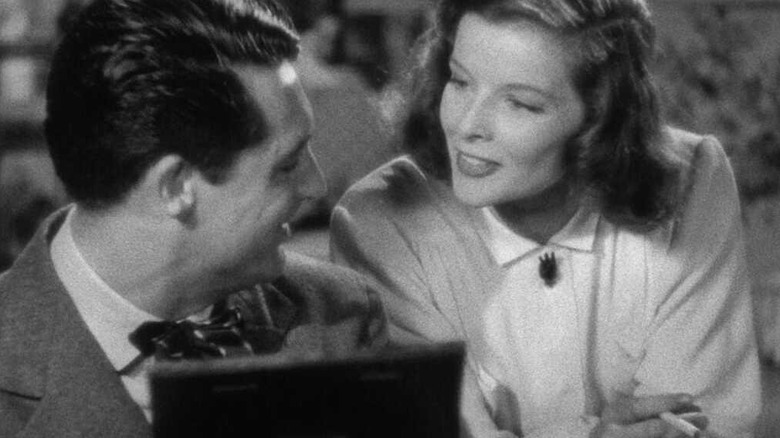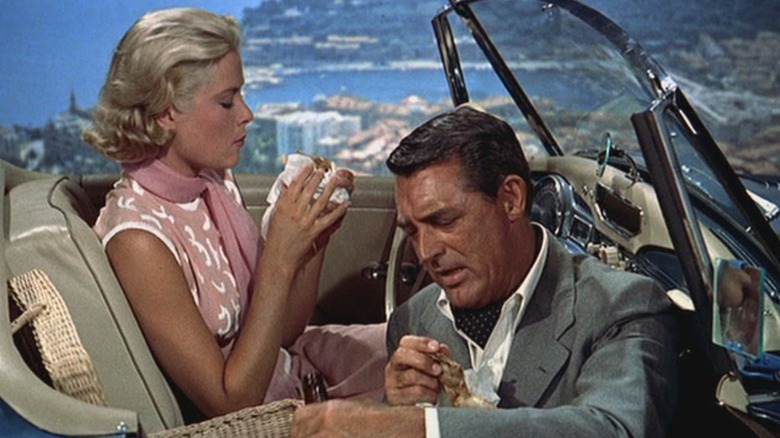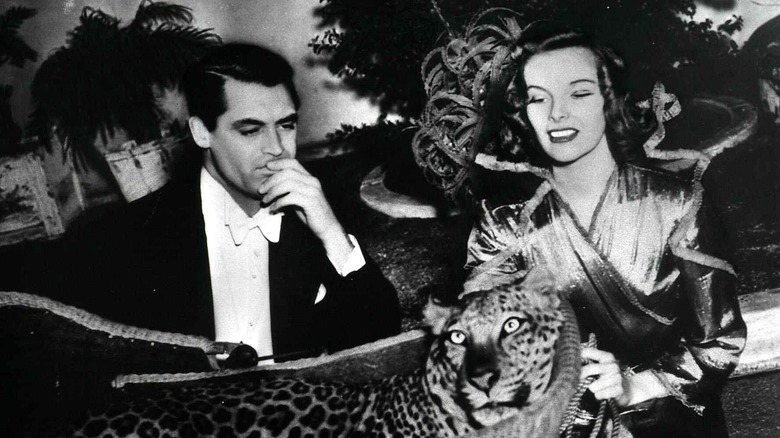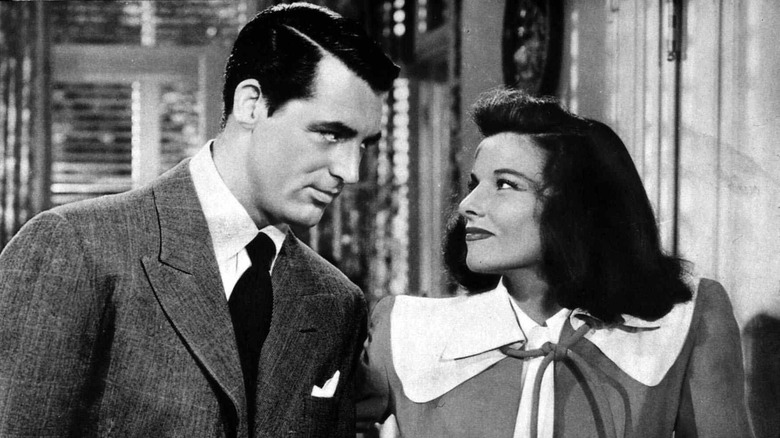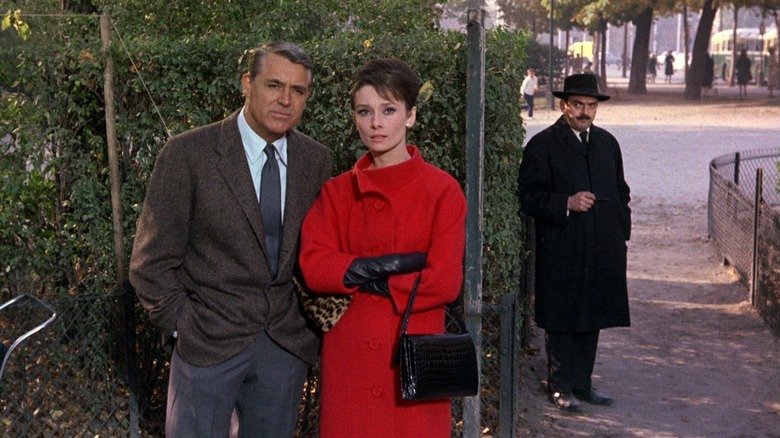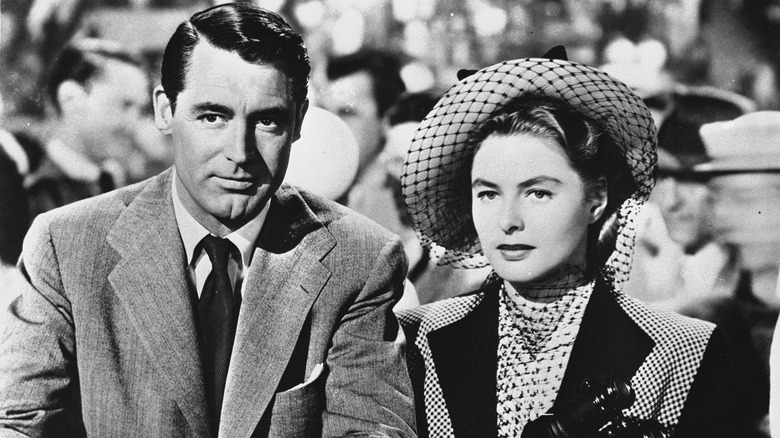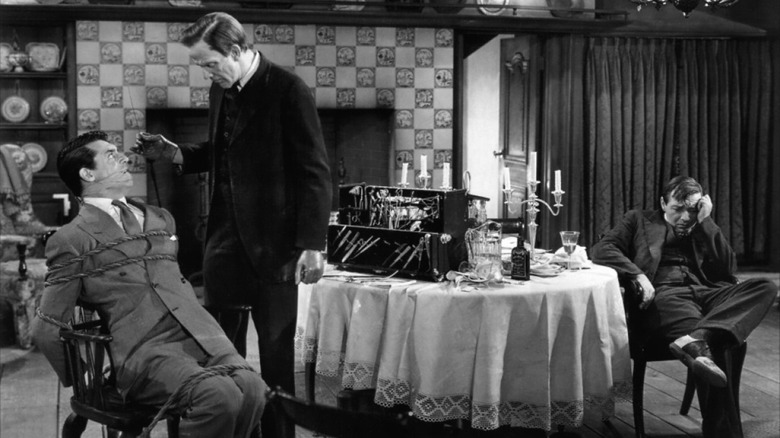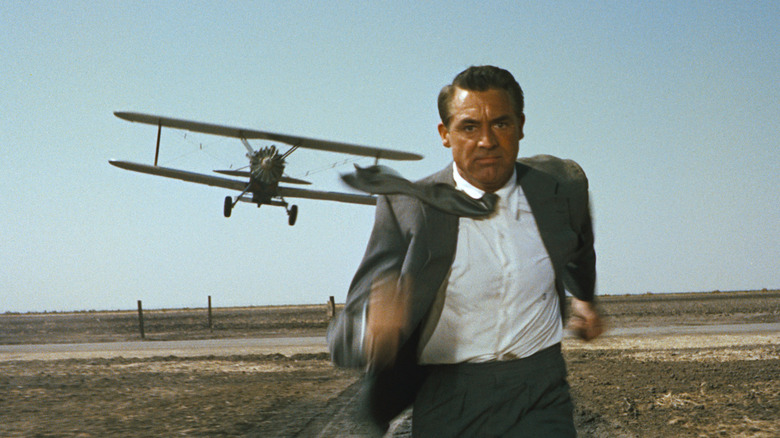Every Cary Grant Movie Ranked From Worst To Best
Emerging in the 1930s as one of Hollywood's most dashing leading men, actor Cary Grant was a likable, good-looking star who dazzled audiences for more than three decades. His earliest films were pre-code features that sometimes had risqué storylines, while his later works were some of the most celebrated dramas of their era. He surprised the world when he retired from acting at the age of 62, shifting his focus to his blossoming family. It was the end of an era for Grant, who was still one of the most well-known and recognizable movie stars at the time.
Grant often played wealthy men-about-town, suave soldiers, and charismatic executives. He starred opposite some of Hollywood's most famous leading ladies, from Katharine Hepburn and Doris Day to Marilyn Monroe and Rita Hayworth. His body of work was varied too: He appeared in nearly as many screwball comedies as he did heartfelt dramas, and he made a number of tense thrillers, including four Alfred Hitchcock classics. Grant died of a stroke in 1986, but he remains an icon of old Hollywood. We've been through his entire catalog and ranked every one of his starring roles from worst to best.
65. Enter Madame
Based on the stage play of the same name, "Enter Madame" may be Cary Grant's "worst" film, but it's worth noting that even this one has its charms. One of them is Grant himself, who plays Gerald Fitzgerald, an obsessed fan of opera and of singer Madame Lisa Della Robbia (Elissa Landi) in particular. When an accident strikes during one of her performances, Fitzgerald comes to her rescue, and the two quickly fall in love and marry. After their rapid courtship, Madame Della Robbia is due for a tour of Europe, and the doting Fitzgerald goes along for the ride.
When Madame Della Robbia decides to remain on tour instead of returning to America to spend time with her new husband, it spells trouble. Though Fitzgerald is supportive, his time alone allows them to grow apart and for him to spark a romance with another woman, a former flame called Flora (Sharon Lynn). When Madame Della Robbia discovers his affair, she concludes that she hasn't been attentive enough to keep him faithful, and she is determined to win Fitzgerald back.
64. Kiss Them for Me
Cary Grant stars as a womanizing Navy pilot in "Kiss Them for Me," a romcom released in 1957. He plays Commander Andy Crewson, who arranges shore leave in San Francisco for himself and two compatriots with plans to party hard. Lieutenant McCann (Ray Walston), a married man running for Congress, hits it off with a blonde named Alice (Jayne Mansfield). Crewson appears to have his pick of the single ladies, but he's only got eyes for Gwinneth Livingston (Suzy Parker), the fiancée of shipping tycoon Eddie Turnbill (Leif Erickson).
Romantic hijinks ensue, with Livingston predictably falling head over heels for Crewson and abandoning her husband-to-be. It's a mildly amusing romp but doesn't live long in the memory. In the end, McCann wins the election, and the two remaining pilots get a cushy assignment away from the horrors of war. A great group of actors are sadly wasted in "Kiss Them for Me," though Mansfield is memorable as the flirtatious Alice.
63. The Pride and the Passion
Three big Hollywood stars came together for "The Pride and the Passion," a 1957 war movie with Cary Grant, Frank Sinatra, and Sophia Loren. Set during the Napoleonic Wars, Grant appears as Captain Anthony Trumbull, a British Royal Navy ordnance officer on a mission to find a large artillery cannon abandoned by the Spanish and now at risk of falling into French hands. Superstar crooner Sinatra co-stars as Miguel, leader of a band of Spanish rebels, with young starlet Loren playing Juana, Miguel's mesmerizing mistress. She gets caught between the two men in a passionate love triangle.
Miguel and his men offer to help Trumbull recapture the massive cannon, but in exchange, he wants their help in shelling a fort occupied by the French. The film follows their attempts to take control of the cannon, while the villainous General Jouvet (Theodore Bikel) has his own designs on the weapon. While it has a compelling premise and an incredible cast, the movie would become much more famous for the affair that took place between the married Grant and the engaged Loren. The film itself was not one for the history books.
62. Kiss and Make-Up
In "Kiss and Make-Up," a trite and somewhat forgettable romantic comedy from 1934, Cary Grant plays a skilled cosmetic surgeon named Maurice. His latest patient is Eve Caron (Genevieve Tobin), the wife of the prickly Marcel Caron (Edward Everett Horton). Marcel becomes unhappy when the surgery leads to other men becoming attracted to his wife. He divorces Eve, much to Maurice's delight — the good doctor acts swiftly to marry her.
Meanwhile, Maurice's secretary Annie (Helen Mack), who secretly desires her boss, begins dating Marcel. It doesn't bother Maurice to begin with, but he soon comes to realize that he made a terrible choice. It's not long after their wedding that Maurice discovers Eve is actually a total narcissist, and when Annie quits her job, his practice falls apart. Of course, in the end, Maurice leaves the pampered Eve and ends up with Annie, just as you'd expect from this sort of routine romcom.
61. Dream Wife
In 1953's "Dream Wife," a woman named Effie (Deborah Kerr) breaks things off with her husband Clemson (Cary Grant), who is clearly not happy with her new independent streak. Clemson is looking for a woman who is a bit more traditional, and he finds his perfect match in a visiting foreign princess named Tarij (Betta St. John), whose country has a more old-fashioned take on gender roles. While in America on business, Tarij is assigned a diplomatic escort by the State Department, and it just so happens to be Effie.
With Effie's help, Tarij soon learns that she doesn't have to stick to outdated attitudes when it comes to relationships. It's not long before the princess comes to embrace American feminist ideas. A clash of cultures leads to a number of comical misunderstandings, and Tarij helps Effie loosen up a little bit, too. In the end, everyone learns a lesson, but "Dream Wife" is still a film very much of its time — this rather unremarkable romcom is full of tired clichés and old Hollywood sexism.
60. The Howards Of Virginia
1940's "The Howards Of Virginia" puts Cary Grant in the role of farmer and colonial settler Matt Howard. He falls in love with the snobbish socialite Jane Peyton (Martha Scott) in colonial America, right before the Revolutionary War. While Jane's family does not approve of his lower class upbringing and attitudes, Jane is attracted to his frontier gumption. The two soon marry and start a family, building a house and a plantation of their own in Ohio. But after a time, Jane's pretentiousness resurfaces and she eventually becomes unsatisfied with life on the frontier.
Matt decides to move to Williamsburg and join Virginia's governing legislature, hoping it will lift them out of their rural lifestyle. But in this new world of politics, Matt is confronted with the idea of American independence, and becomes a passionate supporter of the anti-British movement, even going to Philadelphia to help fight for the cause. This does not sit well with Jane, who demands Matt stay home and lead the family. His involvement in resisting British forces puts him in direct conflict with his upper class in-laws, who remain loyal to the crown.
59. Madame Butterfly
Though there had been several silent film versions of the original play, the 1932 feature film "Madame Butterfly" was the first in the sound era, and to this day remains the only Hollywood adaptation (David Cronenberg's "M. Butterfly" is based on a semi-related play by David Henry Hwang). Starring Cary Grant opposite Sylvia Sidney in the title role, it tells the story of Cho-Cho San, a beautiful Japanese woman who falls deeply in love with an American Lieutenant named Pinkerton. Though they marry, Pinkerton has no intention of committing to her. He intends to return to America, where he plans to marry another woman.
As she raises their son, Cho-Cho San waits patiently for the husband she thinks will one day return. With the help of the American consulate, she gets word to Pinkerton. But when he comes to visit, it's not a happy reunion. Though a relatively faithful adaptation, it's an unusual role for Grant, who rarely played such a scurrilous and cold-hearted man. The overall production looks nice, and Giacomo Puccini's original score is used to good effect, but it otherwise leaves a lot to be desired.
58. Gambling Ship
1933's "Gambling Ship" stars Cary Grant as Ace Corbin, a charismatic Chicago gangster and beer baron who's just freed himself from a false murder charge. Looking to start over, he changes his name and heads to California by train. Aboard the locomotive, Corbin meets Eleanor La Velle (Benita Hume), who is also hoping to escape her old life. La Velle is the mistress of big time gambler Joe, who owns a floating casino steamship called the Casino Del Mar.
Eventually, despite old foes trying to stand in his way, Ace comes into ownership of the casino. He and La Velle enter into a steamy romance while keeping their shady pasts hidden from each other, a predictable recipe for disaster. In fact, everything about "Gambling Ship" is painfully predictable, from the plot to the characters. Despite a solid cast and Grant's typically strong performance, this is a by-the-numbers noir drama that feels like it's trying a bit too hard.
57. The Last Outpost
An epic adventure film, 1935's "The Last Outpost" takes place during World War I. British officer Michael Andrews (Cary Grant) is caught by Kurdish forces and sentenced to death. He gets saved by an undercover spy named John Stevenson (Claude Rains) and the two soon become close allies, making their way out of the region before being separated. Andrews and Rosemary (Gertrude Michael), a young nurse who helps with his recovery, fall in love. Rosemary reveals that she is married, leaving Andrews heartbroken. Little does he know that Rosemary is actually the wife of his friend and savior, John Stevenson.
Later, while Andrews is serving in Sudan, Stevenson learns of the affair and demands a confrontation. However, an impending battle at the fort where Andrews is stationed may mean he'll have to help fight off enemy forces alongside his love rival before he can have it out with him. "The Last Outpost" may delight old-time movie buffs, but the love triangle (complicated by a confusing war story) isn't that compelling. This one simply doesn't stack up against other better movies of its type.
56. Once Upon a Time
A fanciful family film, "Once Upon a Time" stars Cary Grant as Jerry Flynn, a hit Broadway producer who's on a losing streak. After a number of major flops he's in serious trouble, and he's looking for a way to save his theater. Thankfully he happens upon a young boy named Pinky who owns an unusual dancing caterpillar that he's named Curly, and he's suddenly struck with a brilliant idea. With the help of Pinky and his big sister Jeannie, Jerry turns Curly into a national icon, an entertaining sensation that delights millions and enchants the masses.
As Grant romances Jeannie, he hatches a plan to finally buy back his theater by selling Curly to none other than Walt Disney for a tidy sum. But when he finds himself going behind little Pinky's back to steal the caterpillar from him, he has a change of heart. You may get some entertainment value out of this one as a curiosity, but the oddball story and inexplicable romantic subplot make it the kind of oddity that's an easy skip.
55. Night and Day
A high profile biopic of superstar composer Cole Porter, 1946's "Night and Day" had Hollywood's biggest leading man in the starring role. The film follows the musician's career from his early days at Yale and his years serving in World War II to his tragic horse-riding accident and its aftermath as he resurrected his career. It also chronicles his courtship, romance, and marriage to Linda Lee Porter, though because it was produced nearly a decade before Porter's death (and was made with his full cooperation), it is heavily fictionalized in favor of the musician.
Though a decent enough family film, it ultimately does not give a full picture of the life of Porter, winding up a cheery musical rather than an earnest dramatic look at the life of a star. As a contemporary account it does not touch on his marriage being an arrangement of convenience in an era when his homosexuality would have blacklisted him, or his final years of despair after he finally had one of his legs amputated.
54. Born to Be Bad
Not to be confused with the 1950 film of the same name, 1934's "Born to Be Bad" stars Loretta Young opposite Cary Grant. Young plays Letta Strong, a single mother who is raising her son Mickey on the streets. To support him, Loretta gets a job "entertaining" important clients for a friend. When her son is struck by a milk truck driven by wealthy business owner Malcolm Trevor (Cary Grant), she sees it as an opportunity to finally strike it rich and get off the streets. The plan backfires, and Mickey ends up in Trevor's care.
The trouble with "Born to Be Bad" is that it came out when the Hays Code was just coming in. The studio wasn't bound to make the film family friendly when it started production, but by the time it was due for release, the rules on what could and could not be shown had been tightened considerably. The fact that the movie's single mother was a "prostitute" meant that censors went to town on it — by the time they were satisfied, the runtime was just 62 minutes.
53. Sylvia Scarlett
The first of four features to partner Cary Grant with Katharine Hepburn, 1935's "Sylvia Scarlett" follows the title character (Hepburn), a charming con artist on the run with her father. To stay one step ahead of French authorities, Scarlett is forced to disguise herself as a man and take the name Sylvester. Scarlett's father befriends the charming cockney scoundrel Jimmy Monkley (Grant), who allies with the father-daughter duo and takes part in their con games. Together they go on a number of devious misadventures, scamming unsuspecting people.
Notorious for being the box office flop that briefly destroyed Hepburn's career, "Sylvia Scarlett" is known for its behind-the-scenes controversies more than anything else. Reportedly, Hepburn was so well aware of how bad the movie was that she and others offered to make another movie for the studio for free if they'd never release it. Still, it can be appreciated for Grant's impressive performance, which set him up as an emerging leading man.
52. The Amazing Adventure
A remake of the 1920 film "The Amazing Quest of Ernest Bliss," 1938's "The Amazing Adventure" stars Cary Grant as wealthy socialite Ernest Bliss. Bliss has grown bored with his easy life, and makes a bet that he can survive a year without touching the millions he has stashed away. He tries to live off whatever money he can earn from scratch, and predictably finds it a lot harder than he expected.
While he initially struggles, Bliss somehow manages to get a job as an appliance salesman. He's terrible to begin with, but his clever ideas help the business boom, so much so that the owner offers him a full partnership. Bliss declines, and moves on to a new job as a chauffeur, taking with him the love of his boss' secretary Frances. When a series of misfortunes befall her, Bliss has just the solution.
A story that might have worked better as an hour-long TV episode, "The Amazing Adventure" relies heavily on unlikely coincidences and questionable logic. It's another unmemorable early entry in Grant's career.
51. Wedding Present
In 1936's "Wedding Present," Cary Grant plays an absent-minded reporter named Charlie, who, alongside his partner Monica "Rusty" Fleming, does whatever he can for a story. Their tactics are unorthodox and unconventional, and they're constantly clashing with their editor, but they get the job done. Rusty's ultimate goal is to marry her partner, something Charlie seemingly has no interest in. After returning from a vacation, Rusty finds Charlie has been promoted to editor, and is now the very thing they used to fight against: A demanding, strict, and by-the-book boss.
This leaves Rusty spurned, and she immediately takes off for New York, leaving Charlie behind to take over the role. When the newly minted editor comes to his senses and finally follows her to get her back, he learns that Rusty has found a new man. Can the oddball win the heart of his former flame, or will he be forced to watch her marry someone else? A bit of a slog, "Wedding Present" is far from the best film in Grant's catalog, proving almost as scatterbrained as its lead character.
50. She Done Him Wrong
Set in 1890's New York, a burlesque entertainer named Lady Lou (Mae West) is known to most men in town, and that's just the way she wants it. Working as a singer in a seedy bar whose owner is involved in any number of illegal dealings, she and her boss have come to the attention of a young federal law enforcer named Cummings (Cary Grant), who has set up shop in the mission adjacent to them to spy on their activities. At the same time, Lady Lou's former lover Chick Clark has been sent up the river, and his jealous streak has him threaten anyone who comes near her. That includes Cummings, the government agent posing as a mission worker.
When Chick breaks out of the slammer and comes looking for Lady Lou, things get messy. It leads to a violent encounter that leaves the police gunning for him — and Lady Lou running for her life. Thankfully, Cummings is there to protect her, even if she doesn't know it. Grant puts in a typically committed performance here and is easily the best part of an otherwise skippable picture.
49. Ladies Should Listen
In 1934's "Ladies Should Listen," we meet Anna Mirelle (Frances Drake), a telephone operator that works in an apartment building that's also home to handsome executive Julian De Lussac (Cary Grant). Through her brief interactions with De Lussac over the phone, Anna becomes smitten with him and learns as much as she can about every aspect of his life, despite never meeting him in person. When he returns from a business trip to South America, De Lussac is happily involved with a woman named Marguerite. It turns out she's actually the wife of a devious thief named Ramon Cintos and has seduced him in an attempt to gain control of his business dealings.
Fortunately, Anna's obsession with Julian has led her to listen in on his calls and she learns the truth about the criminal conspiracy. We get some twists and turns (there's a third admirer, a devious double cross, and a jealous friend), but "Ladies Should Listen" is a less than satisfying screwball comedy with a bit too much going on. Grant is good as always, but this film probably would have been better off as a more straightforward romance.
48. The Toast of New York
Inspired by true events, "The Toast of New York" stars Cary Grant and Edward Arnold as Nick Boyd and Jim Fisk, two powerful players on Wall Street in the latter half of the 19th century. They start out as ruthless cotton smugglers during the Civil War, but their Confederate bonds become worthless when the Union comes out on top. They head to New York, where Jim becomes a successful stock broker and begins wooing an entertainer who happens to be in love with Nick.
Eager to strike back against his critics, Jim makes a fatal mistake. He attempts to corner the market on gold, and it backfires spectacularly. Nick maneuvers against him in a desperate bid to save his friend from financial ruin, but after a panic on the stock exchange that necessitates a government response, it may be too late. One of several period pieces in Grant's career, the actor once again plays a debonair charmer who we can't help but root for.
47. Every Girl Should Be Married
Cary Grant and Betsy Drake, the two stars of 1948's "Every Girl Should Be Married, tied the knot about a year after the film's release. They star as Dr. Madison Brown and Anabel Sims in this romcom, the story of a woman who wants a husband and a man who doesn't want to become one. Dr. Brown is happily single and not in any way eager to change that fact, but Sims wants a husband and she has set her sights on him.
Not afraid to plot and scheme her way to what she wants, Sims begins a campaign to win over the dashing doctor. In one ploy, she uses her boss in the hope of making Brown jealous, but all this does is make her boss actually fall for her. A series of mishaps and hijinks ensue, with a third suitor (an old flame named Joe) trying to win her back at one point. But, despite the fact that Brown can see right through her games, she still winds up in his arms by the end.
46. Wings in the Dark
1935's "Wings in the Dark" sees ace pilot Sheila Mason (Myrna Loy) forced into a career performing in stunt shows and skywriting. She is involved with fellow pilot Ken Gordon (Cary Grant), who is also an engineer and inventor. He's working on a mechanical cockpit system that will allow pilots to fly on a kind of auto-pilot, long before that kind of technology became standard. Tragedy strikes when Ken is blinded in an accident and must abandon his career as a pilot, giving up on his latest invention as well. Sheila continues to support him, providing him with money she earns from performing daredevil stunts.
Hoping to secure a big score to pay for a life together, Sheila enters a competition to make a risky one-person flight from Moscow to New York. The winnings would set them up comfortably, but things go wrong when she nears New York and loses her way in dense fog. Now it's up to Gordon to regain his confidence and use his untested invention to help guide Sheila home safely — and win a whopping $25,000 (more than half a million dollars in today's money) in the process.
45. Suzy
Cary Grant leads the line in 1936's "Suzy," a World War I drama in which he plays a French pilot named Andre Charville. But, as the title suggests, the movie isn't about the flying ace. This is the story of Susanne Trent (Jean Harlow), a showgirl seeking a man of wealth and status. She finds one in Terry Moore (Franchot Tone), an Irish pilot, and the two quickly marry. But before they can start their life together, Moore is shot by an unknown woman. Suzy fears she'll be blamed and goes on the run, relocating to Paris. She meets Charville, a charming French soldier and pilot, just as World War I is breaking out.
It's not long before Suzy and Charville tie the knot, but their wedded bliss is anything but, as the pilot regularly cavorts with friends and other women. The real trouble breaks out when her "deceased" husband Moore turns up very much alive and Suzy discovers the identity of the woman who shot him. Fearing the mystery woman may be an enemy agent, she'll have to sort things out with the two men before she can stop the assassin from striking again.
44. Once Upon a Honeymoon
About a decade after he starred in "Once Upon a Time," Cary Grant appeared in the similarly titled "Once Upon a Honeymoon," a wartime romantic comedy also starring Ginger Rogers. Grant plays a journalist named Pat O'Toole. He has a hunch that Austrian playboy Baron Franz Von Luber (Walter Slezak) may be a secret enemy sympathizer and follows his lead to the man's wife, Katherine O'Hara (Rogers). The baroness, it transpires, is a former burlesque dancer who used Von Luber's status to achieve a better lifestyle.
O'Toole hopes to enlist O'Hara's aid in spying on Von Luber, but the status-obsessed woman knows turning her husband in won't exactly be good for her. This conventional romcom then follows O'Toole's dogged pursuit of Von Luber as he and O'Hara criss-cross through Europe together, with Von Luber selling arms to various German military officials along the way. After the invasion of Poland, Von Luber becomes a suspect. When witnesses to his crimes start turning up dead, O'Toole and O'Hara realize that they're in more danger than they realized.
43. None But the Lonely Heart
Cary Grant stars as a cocky tough guy in 1944's "None But the Lonely Heart." Ernie Mott is a troubled wanderer who wants nothing more than to leave his hometown and find a new adventure somewhere else. Just before he's due to leave, he learns that his mother is stricken with cancer, and opts to stay to care for her. His spirits are lifted when he falls for a young local woman named Ada, but he ends up in the employ of a local gangster. The law comes after him when he's suspected of stealing cars.
Ada begs him to leave his life of crime and start a new one with her, but Ernie insists he can't leave his ailing mother's side. Tragically, one of Ernie's next scores gets his mother in trouble with police and she ends up behind bars. A dark melodrama, "None But the Lonely Heart" would net Grant an Academy Award nomination for best actor.
42. The Woman Accused
A pre-code crime drama, the 1933 film "The Woman Accused" saw a younger Cary Grant share the screen with Hollywood veteran Nancy Carroll. Grant stars as Jeffrey Baxter, a skilled attorney who is planning an ocean cruise with Glenda (Carroll). The two are to be married while at sea. Just before they are to disembark, Glenda's former lover Leo resurfaces and says he has paid someone to kill Jeffrey, prompting Glenda to murder Leo. As she and Jeffrey set sail, she acts as if all is well, despite knowing that a hitman may be stalking them.
Aboard the ship, Leo's former business partner suspects Glenda of the killing and puts together a mock trial, with Jeffrey defending his fiancée from a murder charge. Thanks to some slick maneuvering, Glenda unwittingly confesses, and once the ship comes ashore she's taken into custody. Now Jeffrey must fight to defend her for real if he wants to marry her and build a life.
41. The Grass Is Greener
The 1960 romantic comedy "The Grass Is Greener" is set in England, where Victor (Cary Grant), the Earl of Rhyall, lives with his wife, Lady Hilary (Deborah Kerr). Times are tough for them, so the couple open sections of their considerable estate to the public, with tourist visitors coming and going from time to time. One such visitor happens to be Charles Delacro (Robert Mitchum), an American oil baron who bumps into Hilary during his visit and becomes enamored with her.
Interestingly, Victor doesn't get jealous about the attention the American gives his wife, even inviting Charles to join them for a fishing trip — along with his former flame, Hattie Durant (Jean Simmons). They proceed to fight for each other's attention, but, in the end, it all leads to a climactic duel between Charles and Victor for Hilary's love. This is a run-of-the-mill story about a woman torn between two men, but the charming and delightful cast elevate it in places.
40. Hot Saturday
In one of his first leading roles, Cary Grant stars as wealthy socialite Romer Sheffield in 1932's "Hot Saturday," a drama about a supposedly promiscuous woman plagued by hearsay and vicious rumors. Ruth Brock (Nancy Carroll) attracts the attention of many men, including Romer, who pursues her diligently, much to her surprise. She's more interested in a local banker named Connie Billup (Edward Woods), who quickly becomes jealous of the attention she receives from Romer.
When she decides he's not the guy for her, Connie becomes bitter and spreads gossip that she and Romer are having an affair. Before long, Ruth is fired from her job, and her good friend Bill (a well-meaning geologist who has had feelings for her all along) starts to believe the ugly rumors about her. While Bill eventually comes to his senses, it's too late — Ruth gets with Romer, the one man who never judged her.
39. Houseboat
"Houseboat" stars Cary Grant opposite Sophia Loren. The gossip around Hollywood was that Grant's affair with the Italian beauty caused the end of his marriage to Betsy Drake, who was originally supposed to co-star in this picture. Grant plays Tom Winters, a U.S. State Department lawyer who suddenly finds himself a single father to three young children when his wife dies. Looking for help in raising the kids, he hires a young Italian woman visiting Washington named Cinzia Zaccardi (Loren) to be his maid and caretaker.
When the kids want to move out of Washington D.C. and into the country, Winters takes Cinzia with them. When they get there, they learn the house was destroyed, and they're left to stay in a rundown, beat-up houseboat. Meanwhile, Tom's former sister-in-law Carolyne is romancing him, having been in love with him for years. But just as things start to get serious between them, Tom realizes that it's Cinzia he is really meant to be with.
38. That Touch of Mink
The romantic comedy "That Touch of Mink" centers on Cathy Timberlake (Doris Day), an unemployed single woman looking for something serious. She meets the well-to-do and charming Philip Shayne (Cary Grant) when his Rolls Royce splashes mud on her as she walks to a job interview, and Philip falls for her during the encounter that follows. However, he's simply pursuing a love affair, and therefore does not meet Cathy's desire for a serious relationship and marriage. Philip's assistant Roger and Cathy's friend Connie are both uneasy about the partnership.
Of course, while Philip is initially adamant about not wanting anything serious with Cathy, he can't help falling in love with her. To convince him that marriage might be just what he really wants, Connie plans a ruse to make him see the light. An average '60s romcom, it's memorable for pairing Grant with Doris Day and for some baseball cameos — in a key scene where Phillip and Cathy attend a ballgame, legendary players Mickey Mantle, Roger Maris, and Yogi Berra all appear in cameos, playing themselves.
37. Walk, Don't Run
In what would be Cary Grant's final role, he played British business executive William Rutland in the 1966 film "Walk, Don't Run." Set during the 1964 Summer Olympic Games in Tokyo, there's a housing shortage when Rutland comes to town and is forced to rent a room from the uneasy Christine Eastman, who would have preferred a woman as a renter. But before she knows it, Rutland is moved in and even sublets his own space to an American competitor in the games named Steve Davis. He also takes on the role of fatherly mentor and tries to give advice to the reluctant Eastman.
Rutland thinks that Eastman can do better than her current boyfriend, a dull English diplomat. Attempting to play matchmaker, Rutland puts Eastman and Davis together, hoping sparks will fly. Though it didn't exactly send Grant out on a high note, "Walk, Don't Run" is an easygoing, lightweight comedy that you don't have to pay much attention to in order to enjoy. Retiring at just 59, Grant withdrew from the screen to spend time with his family. Some would try to lure him back with enticing roles in major movies, but Grant wouldn't appear in another film.
36. Big Brown Eyes
Cary Grant plays dedicated cop Danny Barr in "Big Brown Eyes," and he's on the hunt for a gang of jewel thieves. But the crooks aren't the only people he has to face off with in this 1936 crime comedy: He also spars with his longtime girlfriend Eve Fallon (Joan Bennett), a sassy salon worker turned reporter who believes she can help find the burglars. After nabbing the gunman whose stray bullet killed a young child, both are incensed when the thief escapes justice thanks to a top notch lawyer. Danny quits the force in disgust, and Eve finds herself back in the salon painting nails.
As Danny pursues his own leads to track the leader of the gang, Eve overhears a conversation at the salon that proves key to finding the mastermind. Eventually, their separate investigations collide, and the two lovers team up to take the culprit down. There's nothing very new or clever here, but the chemistry between Grant and Bennett makes "Big Brown Eyes" worth watching.
35. Thirty Day Princess
A comical romantic caper, "Thirty Day Princess" stars Cary Grant in the early part of his career, playing a media magnate named Porter Madison III. It also stars a young Sylvia Sidney in dual roles. The film follows the affairs of Zizzi Catterina (Sidney), a princess from the fictional Kingdom of Taronia who pays a visit to New York in an effort to secure a loan of $50 million for her impoverished nation. The loan hangs in the balance when Catterina is struck with the mumps soon after arriving in the city and must remain in quarantine for thirty days.
With the princess out of action, Richard Gresham (Edward Arnold) — the banker who is backing the deal — recruits the services of a struggling actor named Nancy Lane (also Sidney) to play the part of the princess. If she can successfully negotiate with the man who stands in the way of the deal, Grant's publishing tycoon Porter Madison III, she stands to collect a cash payout. Madison (rather predictably) falls in love with Lane, but he has no idea she's not really a princess.
34. Crisis
Cary Grant and Paula Raymond star as a vacationing husband and wife in the 1950 film noir "Crisis," the story of a doctor facing an ethical dilemma. Grant plays Eugene Ferguson, a respected brain surgeon. He's taking a well-earned break with his wife in Latin America when a rebel uprising begins. The revolutionaries hope to overthrow the nation's brutal dictator Raoul Farrago (José Ferrer), who needs medical attention. Ferguson is kidnapped by government forces, who want him to operate on the president.
With Farrago in dire need of his surgical talents, Ferguson must decide whether or not to save the life of the villainous madman. He tries to use his presence as a tool to call for peace, but to no avail. The doctor begins to feel bound by the Hippocratic Oath, even though Farrago shows no signs of abating his murderous ways. His options narrow when the rebels kidnap his wife and pressure him to let the dictator die on the operating table. A suspenseful psychological thriller, it may not be among the best in Grant's catalog, but it proves a novel story and an effective, thought-provoking drama.
33. Indiscreet
A late romantic comedy from Cary Grant, 1958's "Indiscreet" reunited the actor with his "Notorious" co-star Ingrid Bergman. The film follows Anna Kalman, a disillusioned actress in London searching for a husband. She meets a dashing economist named Philip Adams, and the chemistry between them is electric and instant. Philip soon reveals that he can never make their relationship more serious, as he is still legally married and unable to divorce, breaking Anna's heart. Still, she can't let go of her love, and the two continue their relationship until Philip gets a new assignment that will send him to New York for several months.
Prior to his departure, Anna learns that Philip has been lying to her all along and is not actually married at all. Deeply apprehensive about commitment, he made the whole thing up so that their relationship never had to go to that next level. But just as Anna is plotting to get her payback and convince him she's been unfaithful, Philip has a change of heart and decides to propose marriage, leading to a comical mix-up as he walks in on Anna with another man. It's got some flaws, but it's far from Grant's worst romcom.
32. I'm No Angel
1933's "I'm No Angel" certainly made the most of its pre-code release. Starring Cary Grant and Mae West, it's the story of raunchy circus performer Tira (West), the popular main attraction of Big Bill Barton's Wonder Show. She scams onlookers too distracted by her moves to notice that they're being pick-pocketed by her con artist boyfriend. Always caught up in some scheme or another, Tira begins to worry about getting caught and makes her way to New York. There she meets wealthy big shot Kirk Lawrence (Kent Taylor), who is quickly obsessed with her.
Kirk's cousin Jack Clayton (Grant) initially tries to break up the budding couple, but he soon comes to see why Kirk likes Tira — he winds up headed to the altar with her himself. But renouncing her act and quitting the show makes Tira enemies back home. When her old partner's arrival prompts Jack to break off their engagement, Tira brings him before a judge, where her promiscuous past is used against her.
31. Monkey Business
No relation to the 1931 Marx Brothers classic of the same name, the 1952 screwball comedy "Monkey Business" stars Cary Grant and two of Hollywood's brightest stars, Ginger Rogers and Marilyn Monroe. Acting against type at the start of the film, Grant takes the role of the archetypal absent-minded professor. Dr. Barnaby Fulton is working for a pharmaceutical company in search of a youth-ifying drug. A monkey gets doused in a mixture of chemicals during a lab accident and he discovers the perfect concoction by chance. Fulton soon realizes that his miracle drug is far more than just an energizing elixir, however.
When he and his wife Edwina both try some themselves, Fulton suddenly has the vigor of a young man again, with the hormones to match. He's soon pursuing his boss' bombshell of a secretary (Monroe). Edwina, meanwhile, starts chasing a former flame named Frank. Those around them have no idea that their behavior is the result of Fulton's experiment, and can't quite understand why they're both acting like carefree young adults all of a sudden.
30. In Name Only
In another tale of a man torn between two women, Cary Grant stars in "In Name Only," a 1939 romantic drama. Alec Walker is a wealthy, aristocratic man of high society whose marriage to his wife Maida (Kay Francis) is loveless and dull. But soon he meets the more vibrant and exciting Julia Eden (Carole Lombard), who stokes his passion for life, and so he seeks a divorce from Maida. His domineering wife admits that she's only ever been with him for his money and his status, and refuses his request for a split, unwilling to give up her lavish living and powerful Walker name.
Maida has conspired to convince everyone around Alec that Julia is responsible for hurting their relationship, and with no divorce in sight, Julia indeed leaves him. Falling into a pit of despair, Alec sees no future himself, and it falls to Julia to reignite his spark and expose Maida for the fraud that she is. Grant has some rare moments of vulnerability as he leans on the woman he's fallen in love with for help.
29. I Was a Male War Bride
The 1949 wartime comedy "I Was a Male War Bride" stars Cary Grant as Captain Henri Rochard, a French officer serving in Allied-occupied Germany just after World War II. There he meets a young American army nurse, Lieutenant Catherine Gates. While at first the two have a contentious relationship, they soon fall in love, but circumstances conspire to keep them apart, and much of the film entails their misadventures trying to get some time alone together. After finally marrying, Gates receives orders to return to the United States, and the newlyweds find themselves utilizing the "War Bride" act, which allows foreigners to gain a visa if they return as the spouse of an American serviceman.
Unfortunately, this act is used almost exclusively by women, and thus nobody is buying Rochard's story as he looks for passage to the States. Deciding that his only course of action is to impersonate a woman, Richard gets aboard a ship bound for American shores, but he is discovered and threatened with prison. It's not until the film's final moments that he and his new bride finally get some private time.
28. Blonde Venus
One of Cary Grant's earliest major credits, the actor plays a supporting part in the film "Blonde Venus," a 1932 drama starring Marlene Dietrich and Herbert Marshall. The story features Dietrich as Helen, a wife and mother who returns to the stage as a showgirl named Blonde Venus to help pay for an expensive life-saving medical treatment for her husband Ned (Marshall). But soon she meets a wealthy patron named Nick (Grant) who offers more help, with the playboy graciously giving her money to pay for her husband's procedure directly.
It's all going smoothly, but when Ned leaves the country for his treatment, Nick and Helen engage in an illicit love affair and are caught by Ned on his return. After Ned says he will leave her and take custody of their son, Helen flees with the child and goes on the run. Life as a single wanted woman with a kid isn't easy, and Helen eventually seeks the help of Nick. Of course, Nick only wants what's best for her boy, so he helps Helen reunite with Ned, even though it means risking his relationship with her.
27. The Eagle and the Hawk
Not to be confused with the 1950 western of the same name, the 1933 war drama "The Eagle And The Hawk" dropped a young Cary Grant right into World War I alongside Fredric March as a pair of fighter pilots in Britain's renowned Royal Flying Corps. Grant plays upstart gunner Lieutenant Henry Crocker, who is recruited by Lieutenant Jerry Young (March) after his co-pilot and gunner is killed in combat. The two get off to a rocky partnership, but soon become close, before Crocker takes notice of Young's jaded weariness in the cockpit.
When Jerry is sent back home to get help for combat fatigue, Crocker's recklessness surfaces and gets his new flying partner killed, and Jerry is given clearance to return to the front. But back in action, Jerry is haunted when he's forced to kill a young German pilot, sending him into a downward spiral. Worried for the legacy of his friend, Crocker makes one final attempt to ensure he'll be remembered a hero.
26. Penny Serenade
George Stevens' 1941 melodrama "Penny Serenade" stars Cary Grant and Irene Dunne in what would be the last of the three movies they made together. They play Roger and Julie Adams, and the movie chronicles the highs and lows of their turbulent but loving relationship. Newlyweds in the 1920s, Julia and Roger are heartbroken when Julia loses their unborn child during a devastating Earthquake. Despondent, they turn to adoption. They are forced to fight to keep their new daughter when Roger gets into financial struggles.
Fast forwarding some years, the couple faces an unthinkable tragedy, and nearly loses all hope. But the final, uplifting moments of "Penny Serenade" are a timeless message never to give up, even in the most trying of times. A heartfelt story of love and loss, Grant gives one of the best performances of his career, one that would earn him the first of just two Academy Award nominations for best actor.
25. Mr. Lucky
1943's "Mr. Lucky" stars Cary Grant as a devious scoundrel, a longtime con artist named Joe Adams. It's set just before America's entrance into World War II. Joe cons his way out of the draft by stealing the identity of a dead friend who'd been deemed unfit to serve, then he hatches a plan to help pay off old debts. To do it, he charms a pair of women into hosting a charity event where proceeds are said to benefit war relief efforts. In reality, Joe and his pals have an elaborate plan to rob the patrons and make off with a major payday.
A letter from the mother of the man whose identity he has stolen makes him rethink his priorities. Unfortunately, Joe's co-conspirators have had no such crisis of faith and force him into going along with the daring scam. Now Joe must somehow find a way to turn the tables on his fellow con artists and win back the heart of Dorothy (Laraine Day), who believes he's stolen all of their money.
24. Destination Tokyo
Thanks to an actor swap that saw Humphrey Bogart appear in "Sahara" for Columbia Pictures, Grant starred in the 1943 war film "Destination Tokyo" for Warner Bros. This seminal submarine movie takes Grant into the ocean depths as captain Cassidy aboard the USS Copperfin. Tasked with a secret mission to Tokyo, Cassidy and his crew of unique characters set out to perform reconnaissance and help the Allies prepare for an invasion of the city.
During the mission they face a number of different setbacks. Morale gets low, and they're forced to improvise when things go wrong. When they're spotted by Japanese ships they have to fight back if they're going to complete their mission and get their intel back home to secure an Allied victory. A mix of gripping suspense and gritty realism, "Destination Tokyo" remains a favorite with audiences and critics, and its astonishing attention to detail saw it used as a training tool for the U.S. Navy in the wake of its release.
23. Room for One More
Inspired by the true story of Anna Perrot Rose, Cary Grant and Betsy Drake (who were husband and wife at the time) star as Anna and George Rose in "Room for One More." They already have three kids but they want more and agree to foster a young troubled girl named Jane. After some initial struggles, she eventually becomes a part of the family, and George offers her the chance to stay for good. Later, Anna and George foster a young boy named Jimmy-John, whose disability requires leg braces. With a wild temper, Jimmy-John has a hard time fitting in, and it's later revealed that the young boy cannot read.
The story follows Jane and Jimmy-John as they overcome their struggles and grow into valued members of the family. George helps Jane overcome her shyness, while Jimmy-John joins the Boy Scouts and learns to read with Anna's help, eventually becoming an Eagle Scout. A celebrated and beloved family film about love, faith, and belonging, "Room for One More" would be adapted into a short-lived sitcom starring Andrew Duggan and Peggy McKay in 1962.
22. Topper
The first in a series of films based on novels by Thorne Smith, "Topper" stars Cary Grant and Constance Bennett as George and Marion Kirby. In the opening, lavish elitists George and Marion are killed in a car crash, but they aren't allowed to leave Earth. The couple become ghosts because they were too decadent in life to have done enough to warrant a trip to heaven or hell. Wondering how they might change their fortunes, they attempt to liven up the life of their old friend Topper, who's trapped in a dull marriage.
It's wonderfully weird, and Grant is on top form. The film was a hit and spawned a pair of sequels ("Topper Takes a Trip" and "Topper Returns"), with actor Roland Young continuing in the title role. Grant did not return, though, with the first sequel involving Marion's attempts to help Topper in life and love. The final film follows Topper's attempts to solve a murder with the help of the victim's ghost.
21. Gunga Din
An epic Hollywood adventure film, 1939's "Gunga Din" is based on the poem by Rudyard Kipling. Cary Grant, Victor McLaglen, and Douglas Fairbanks Jr. play a trio of goofy British sergeants serving in the Corps of Royal Engineers in India. They are sent on a mission alongside Gunga Din (Sam Jaffee), a water-bearer with big dreams of serving the Queen. What they find is a ruthless cult that controls the region.
When Gunga Din says he's found a temple made of gold, the three sergeants set out to find it, but run into the cult and are taken captive before they can warn their superiors. Gunga Din, the underdog and comic relief, proves more courageous than anyone, and may have to make the ultimate sacrifice to save his friends. Though on the surface it may seem like a dark and serious war story, it's more of a pulpy adventure flick, and a memorable one at that.
20. The Bachelor and the Bobby-Soxer
Cary Grant stars alongside Myrna Loy and Shirley Temple in 1947's "The Bachelor and the Bobby-Soxer," a bobby-soxer being the slang term for the teenage girls who followed Frank Sinatra and other musicians in the 1940s. This is a comedy about a teenage girl named Susan (Temple) who pursues the affections of a much older man (Grant). Grant, more than twice Temple's age, is Richard Nugent, a dapper gentleman and a successful artist who guest lectures at Susan's college and instantly becomes the object of her desires.
When Richard (who wants nothing to do with dating Susan) gets into a brawl with District Attorney Tommy over her, a court doctor recommends that Susan should date the older Nugent for her own health. Tommy strikes a plea deal of sorts, agreeing to drop assault charges if Richard will date the impressionable teen. An awkward and slightly uncomfortable romantic starting point if ever there was one. Their courtship is complicated even further by Susan's ex-boyfriend Jerry, as well as Richard's genuine attraction to Susan's older sister Margaret.
19. Mr. Blandings Builds His Dream House
The 1948 comedy "Mr. Blandings Builds His Dream House" reunited Cary Grant and Myrna Loy, who star as Jim and Muriel Blandings. This married couple with two children live in a small New York apartment but have grand aspirations of home ownership. Following an ill-fated attempt to renovate their own apartment they finally agree to relocate to Connecticut, where they are promptly swindled into buying a fixer-upper. After paying far more than the ramshackle place is worth, the needed repairs quickly start to pile up, and so does the trouble.
Before they know it they have to tear the place down and start from scratch, and every subsequent step in the build sets them back even further. To make matters worse, Jim suspects Muriel of infidelity, and problems at work make him fear for his job. It's a timeless tale about a family man's quest to live the American dream, one that was retold (poorly, in the opinion of critics) in 1986's "The Money Pit," starring Tom Hanks, and 2007's "Are We Done Yet?," starring Ice Cube.
18. Operation Petticoat
Before the popular sitcom "McHale's Navy" blended World War II drama with big laughs, Cary Grant and Tony Curtis starred in the wartime comedy "Operation Petticoat," released in 1959. It's mostly told in flashbacks via Lieutenant Commander Matthew Sherman (Grant), who recounts his crazy adventures during the war aboard a run-down submarine called the Sea Tiger. Sunk by a Japanese air raid, Sherman's ship is raised and repaired, but his capable crew have already been transferred. An ill-equipped and improperly trained ragtag group of misfits come in to replace them.
Their mission leads to a number of unexpected encounters, including a visit to a witchdoctor and a run-in with a Japanese oil tanker. Sherman and his men bumble their way through various mishaps, including one that leaves the hull painted a bright pink. Then there's the first officer's comical romantic pursuit of the ship's beautiful second lieutenant, which doesn't go smoothly. Notable for a supporting cast full of future sitcom stars like Gavin MacLeod ("The Love Boat"), and Marion Ross ("Happy Days"), "Operation Petticoat" was turned into a short-lived TV series itself in 1977, with John Astin taking over as Sherman.
17. My Favorite Wife
Starring Cary Grant and real-life wife Irene Dunne, 1940's "My Favorite Wife" is a zany romantic comedy and classic battle of the sexes. Grant's Nick Arden is pit against Dunne's Ellen, Nick's former wife. She had been lost at sea seven years before the movie begins. It's been almost a decade since anyone has seen or heard from Ellen, and so she is finally declared legally dead by the courts, leaving Nick free to marry his new love Bianca (Gail Patrick). Just as they're embarking on their honeymoon, Ellen turns up very much alive, having been rescued from the deserted island where she had been shipwrecked for all that time.
Nick is unable to break the news to Bianca, who questions his sudden unwillingness to consummate their new union, even having a psychiatrist examine him. But Ellen has her own problems. As Nick soon discovers, she was not alone on the island, and the man who was with her all those years (Randolph Scott) may still be in love with her. A wild comic misadventure, "My Favorite Wife" was famously the subject of an unfinished remake starring Marilyn Monroe. She died before the film was completed.
16. Suspicion
The first of his four collaborations with Alfred Hitchcock, Cary Grant is brilliant in the 1941 psychological thriller "Suspicion." The film follows Lina McLaidlaw (Joan Fontaine), a naïve heiress who elopes with a dashing playboy named Johnnie Aysgarth (Grant) despite her father's warnings and objections. Though at first it's a whirlwind love affair, she soon discovers his darker side. Johnnie has a weakness for gambling, some risky business ventures, and a bad temper. She also learns that his high society life is a ruse and comes to believe he only married her for her father's substantial wealth.
Things take a more serious turn when Lina begins to suspect that Johnnie may be more than a reckless womanizer after his friend Beaky (Nigel Bruce) turns up dead. Lina fears that she may be next on her husband's hit list. Like any good Hitchcock thriller, "Suspicion" will keep you guessing, and it boasts a surprise ending that bucks convention. The film was nominated for three Academy Awards, including best picture.
15. Father Goose
The debonair Cary Grant took on an unusual role for the 1954 film "Father Goose," playing a disheveled beach bum named Walter Eckland. Under pressure from a friend, the anti-social Eckland reluctantly agrees to help the Allies in the war effort. He's sent to an isolated island and told to look out for Japanese aircraft, being promised a bottle of whiskey for every enemy fighter he spots. But trouble comes for Eckland when he goes to rescue the stranded coast watcher who's set to replace him. Instead of finding the man meant to take over the job he never wanted, he's forced to give shelter to a group of stranded girls led by the haughty Catherine Freneau, who confirms that his replacement was killed in a raid.
This enjoyable romantic comedy kicks into gear with fireworks between Freneau and Eckland, polar opposites who don't get along to begin with. Eckland cannot stand the French woman's pretentious attitude, while she is utterly disgusted by his boorish ways. But when Eckland reveals himself to be a noble, caring man who does everything in his power to help the girls, sparks begin to fly. Eckland must embrace the role of a hero if he wants to marry the woman he loves.
14. People Will Talk
Set in an era when being a single mother came with certain stigmas, 1951's "People Will Talk" stars Cary Grant as Dr. Noah Praetorius, a medical school teacher who falls in love with a pregnant single woman. Noah's stuffy rival Dr. Rodney Elwell — who resents that he always succeeds with his unconventional and offbeat teaching methods — uses this against him and attempts to drum up a scandal. He also uncovers evidence that Noah's confidante, a shadowy man known only as Mr. Shunderson, may be more than he appears, with a secret that could destroy them both.
A medical drama and romantic comedy, "People Will Talk" features Grant in top form as a charismatic leading man with a soft side and a good heart. It was praised by The New York Times for being a movie with a message. "It is biased, of course, and it takes a little too long to reach its conclusions," reads the review. "But 'People Will Talk' does have something to say and it does so with erudition and high comedy, a compound that is vastly entertaining and rewarding."
13. The Talk of the Town
1942's "The Talk of the Town" stars Cary Grant in the role of Leopold Dilg, who goes on the run after being wrongly accused of arson and murder. While that may not seem like a strong starting point for a romantic comedy, that's exactly what this film is. Dilg escapes during his trial and takes refuge with Nora Shelley, played by Jean Arthur. A longtime school friend, Dilg has harbored a secret love for the beautiful and charming Shelley for years. She keeps Dilg safe from both the law and the prying eyes of her neighbor, legal scholar Michael Lightcap.
Posing as Shelley's gardener, Dilg and Lightcap eventually form an unlikely friendship as they debate the finer points of American law, all while they both spar for the hand of Shelley. Lightcap is assigned to investigate the allegations against Dilg, and starts to see that he may be innocent. With Lightcap's help, Dilg must find the real killer, and Shelley must decide which man she loves.
12. The Bishop's Wife
1947's "The Bishop's Wife" stars Cary Grant as a heavenly angel named Dudley. He comes down to Earth to help Bishop Brougham (David Niven), who has prayed for aid in raising funds to save his church. In human form, Dudley doesn't seem like an angel, but he quickly begins taking an active role in every aspect of Brougham's life. He helps the bishop write his sermons, convinces churchgoers to donate much-needed money, and helps fix up the church grounds. But when he tries helping out at home he gets more than he bargained for — he finds himself smitten with the bishop's wife Julia (Loretta Young).
With an angel trying to steal his wife, Bishop Brougham must fight heaven itself to save his marriage. Meanwhile, Dudley is faced with a hard choice: He must either complete his mission and return to heaven or remain on Earth to be with Julia. Like many of Grant's most memorable films, "The Bishop's Wife" was nominated for a number of awards, including the Oscar for best picture.
11. The Awful Truth
Cary Grant's first outing with Irene Dunne, the 1937 screwball comedy "The Awful Truth" follows married couple Jerry and Lucy Warriner. As events unfold, both begin to suspect that they are being cheated on. They file for divorce and have 90 days until it's finalized, but neither can wait to start seeing other people. While Jerry begins dating a showgirl named Dixie, Lucy goes out with her parents' neighbor Dan, and each tries to sabotage the other's new partnership.
A brief reconciliation between the couple sours when Lucy is found with a man sneaking around in her apartment, and soon Jerry falls into the arms of snobby socialite Barbara (Molly Lamont). While both are adamant that they want nothing to do with each other, they're still very much in love. It just takes a little time — and plenty of nutty antics — for them to arrive at the awful truth of it all. The film was nominated for six Academy Awards, with helmer Leo McCarey taking home the Oscar for best director.
10. Only Angels Have Wings
Cary Grant, Jean Arthur, and Rita Hayworth star in the 1939 film "Only Angels Have Wings." This pulpy drama features Grant as pilot Geoff Carter, who runs a small airline that makes its business running risky routes through South America. Carter has just met talented showgirl Bonnie Lee and their relationship seems to be blossoming faster than his business. Geoff and his team go on an especially dangerous run to secure a lucrative government contract, and it's a mission that Geoff's new lovesick maiden doesn't want him flying. Bonnie causes an accident that keeps Geoff grounded and his untrustworthy co-pilot MacPherson heads out instead.
A romantic love story mixed with high-flying action and adrenaline-pumping adventure, "Only Angels Have Wings" was a triumph for Grant, who was in his element as Geoff Carter. A standout performance from a young Hayworth (she plays MacPherson's wife and Carter's jilted ex-lover) helped catapult her to stardom. The critics loved it, and it's definitely stood the test of time: "Only Angels Have Wings" has a 100% rating on Rotten Tomatoes.
9. An Affair to Remember
The 1957 romantic drama "An Affair to Remember" is among the best films from the later part of Cary Grant's long career. Here he stars as Nickie Ferrante opposite Deborah Kerr as Terry McKay, two spoken-for cruise line passengers who meet aboard the ship. After sparks fly, they agree to reunite in six months atop the Empire State Building in New York City, should they both find themselves single and wanting to pursue a romance together.
Tragedy strikes when Terry is involved in an automobile accident that leaves her wheelchair-bound. Luckily, the two have a chance encounter years later and prove that nothing can stand in the way of true love. The film placed fifth on AFI's list of the greatest love stories ever told, bested only by the likes of "Casablanca" and "West Side Story." It was up for four Academy Awards, though Grant himself didn't receive a nomination.
8. Holiday
The third collaboration between screen legends Cary Grant and Katharine Hepburn, 1938's "Holiday" is a romantic comedy that puts Grant in the role of Johnny Case, a newly engaged man whose fiancée Julia (Doris Nolan) is the daughter of a wealthy banker. After fighting to win the approval of Julia's demanding father, he begins to worry that life as her husband may be a little too limiting for his free-wheeling ways. Things get even more complicated when he meets Julia's self-reliant sister Linda (Hepburn).
The two seem to click, and Case starts to wonder if his future sister-in-law might be a better fit for him. He takes a job at a bank to appease Julia and Linda's father, but he is far more tempted by the idea of traveling the world with Julia. In the end, we can't help but root for them. Adored across the board, "Holiday" has a 100% rating on Rotten Tomatoes and remains a must-see movie for fans of vintage Grant.
7. To Catch a Thief
Alfred Hitchcock's third film with Cary Grant, 1955's "To Catch a Thief" paired the Hollywood leading man with Grace Kelly, another regular Hitchcock collaborator. Kelly was just a few years away from her shocking retirement at the age of 26 (her final big film, oddly enough, was the musical "High Society," a remake of Grant's "The Philadelphia Story"). A romantic thriller, "To Catch a Thief" opens with a retired jewel thief named John Robie (nicknamed "The Cat") enjoying easy living in a French villa. But, despite having left the game for good, Robie finds himself drawn back into his old ways when a series of copycat burglaries hit the countryside and he becomes the prime suspect.
Out to clear his name, Robie goes on the run and investigates the burglaries himself. As he closes in on his suspect he meets Frances, the daughter of a wealthy tycoon. The two fall in love as they work together to ensnare the new master thief and prove that Robie is innocent. A taut and gripping crime caper with all the Hitchcock hallmarks, "To Catch a Thief" delighted audiences and critics alike and remains a beloved film for its unpredictable story and stylish production.
6. Bringing Up Baby
Though not a success upon release, the Cary Grant and Katharine Hepburn comedy "Bringing Up Baby" slowly earned itself a better reputation over the years. Grant plays meek paleontologist David Huxley, who is on a career-long quest to assemble the skeleton of a brontosaurus, needing just one final bone to complete it. As he attempts to impress Mrs. Robson, his museum's newest benefactor (who may very well bankroll them to the tune of $100 million), he meets a young woman named Susan (Hepburn), who turns his simple plan into chaos.
Huxley's life is turned upside down by the high energy bohemian, who (spoiler alert) turns out to be Robson's daughter. He's supposed to be getting married, but that doesn't deter Susan, who quickly becomes obsessed with Huxley and won't let him get hitched without a fight. A slapstick romcom with plenty of laughs, "Bringing Up Baby" is an enjoyable romp that survived a poor release and became known as one of Cary Grant's best comedies.
5. The Philadelphia Story
The final film to feature Cary Grant and Katharine Hepburn, "The Philadelphia Story" is also their best, landing in 1940 to rave reviews. A comeback of sorts for Hepburn, whose box office draw had been called into question following a string of failures, "The Philadelphia Story" follows her in the role of Tracy Lord, an egotistical socialite. Tracy has just divorced her husband C.K. Dexter Haven (Grant) and is already on the verge of nuptials with her new man George Kittredge. Intrepid reporter Mike Cooper (James Stewart) wants to cover the high profile wedding, and, with Dexter's help, he secures an invitation. He intends to write a disparaging expose on the family, but things don't go to plan.
With Mike now in the mix, Tracy finds herself torn between the affections of three dashing men. A star-studded cast on top form helped this romantic comedy become a big hit with critics. The New York Times found it a refreshing return to form, saying, "It has been a long time since Hollywood has spent itself so extravagantly, and to such entertaining effect, upon a straight upper-crust fable." This is yet another Cary Grant film with a perfect score of 100% on Rotten Tomatoes.
4. Charade
Cary Grant was one of Hollywood's elder statesmen by 1963, when he gave a towering performance in a film that would rank among his best. "Charade" has him opposite Audrey Hepburn, who (despite being 25 years younger) plays his love interest. A blend of romance, comedy, and mystery themes, "Charade" is often referred to as the best Hitchcock film that Hitchcock never made. It follows Regina Lampert (Hepburn), whose husband is murdered under mysterious circumstances. A visit from the CIA reveals her lover had once been part of a covert operation during the war, but had betrayed the French resistance and three co-conspirators, making off with a cool quarter of a million dollars.
Both the husband's former criminal associates and the U.S. government think that Regina has the money, but a charming new man in her life named Peter (Grant) helps her to stay one step ahead of them. But, as the film goes on and secrets start to come out, Regina learns more about Peter and is unsure of who she can trust. With a number of twists, turns, and shocking reveals, "Charade" is a stylish classic thriller that will keep you guessing until the very end.
3. Notorious
Alfred Hitchcock recruited Cary Grant a second time for 1946's "Notorious," a film that stands out as a high point in both of their careers. Alongside Claude Rains and Ingrid Bergman, Grant stars as American spy T.R. Devlin. Following World War II, a group of enemy agents have fled to Brazil, and Devlin sets out to bring them in. To do it, he enlists the aid of Alicia Huberman (Bergman), the daughter of a prominent German war criminal who now sits in prison.
Alicia's assignment is to infiltrate the enemy group overseas by winning the heart of one of her father's confidantes, but it's complicated when she and Devlin fall in love. This is one of the best spy movies of all time according to Esquire, and it's one of Grant's best as well. In the era before James Bond, the actor proved the perfect cinematic secret agent, exuding a romantic charm and suave charisma that few have been able to match.
2. Arsenic and Old Lace
A beloved black comedy from celebrated director Frank Capra, 1945's "Arsenic and Old Lace" stars Cary Grant and Priscilla Lane as newlyweds Mortimer and Elaine. Just as they are about to start their new life together, Mortimer discovers that his aunts, Abby and Martha, are serial killers who have been luring lonely bachelors into their home by offering a room for rent. As if that wasn't bad enough, Mortimer learns that his oddball brother Jonathan is also a killer, and the murdering family members squabble over where to bury their victims.
Mortimer must find a way to save his warped relatives from themselves, and with so many psychotic killers in his family, he must also grapple with the thought that somewhere inside him there's a twisted madman just waiting to be unleashed. A dark film with plenty of laugh-out-loud moments, "Arsenic and Old Lace" is as riotous now as it was back then. Grant helped turn this remake of the stage play (which starred Boris Karloff) into a huge hit, eclipsing the original.
1. North by Northwest
1959's "North by Northwest" was the fourth and final collaboration between Cary Grant and Alfred Hitchcock, and the duo were clearly saving the best for last. One of the greatest thriller films ever made, it stars Grant as New York City ad man Roger O. Thornhill, a mild-mannered executive who becomes the target of a shadowy figure named Phillip Vandamm (James Mason). In a case of mistaken identity, Vandamm believes that Thornhill is an intelligence agent. He will stop at nothing to take him down to ensure the success of his latest operation.
The quintessential chase movie, "North by Northwest" sends Grant on a harrowing trek across the country from one location to another in an attempt to stay one step ahead of his pursuers. Featuring some of the most famous action sequences in cinema history (including the iconic scene in which Grant runs away from an oncoming plane), this film has made a big impression on pop culture and proved an enormous crowd-pleaser over the years. Grant made some fantastic films in his time, but "North by Northwest" is easily his best.
